- $40 million to go to underserved SC counties for Hurricane Helene recovery. Here's what you need to know.
- Family honors Air Force veteran Derwin Anderson Jr. after he died in June flash floods
- City of Wilmington addresses flooding on New Centre Drive
- Harnett County fire: Two homes damaged
- Medical examiner identifies 13th victim from massive flash flood in San Antonio
Here’s How Houston City Council Candidates Say They Would Fight Flooding
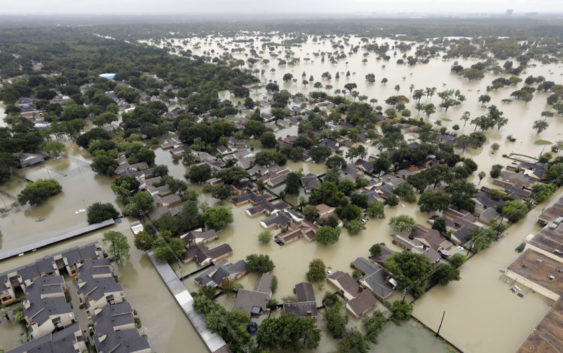
This photo from August 2017 shows a neighborhood near Houston’s Addicks Reservoir after it flooded during Hurricane Harvey.
Houston residents ranked flooding as the most important problem facing the city and its neighborhoods — and more than a third said Houston is doing a poor job of addressing it, according to Houston Public Media/KHOU’s recent poll.
To find out where candidates for Houston City Council stand on the issue, Houston Public Media invited all 111 candidates to respond to a flood survey about how the city and its policymakers should face future storms.
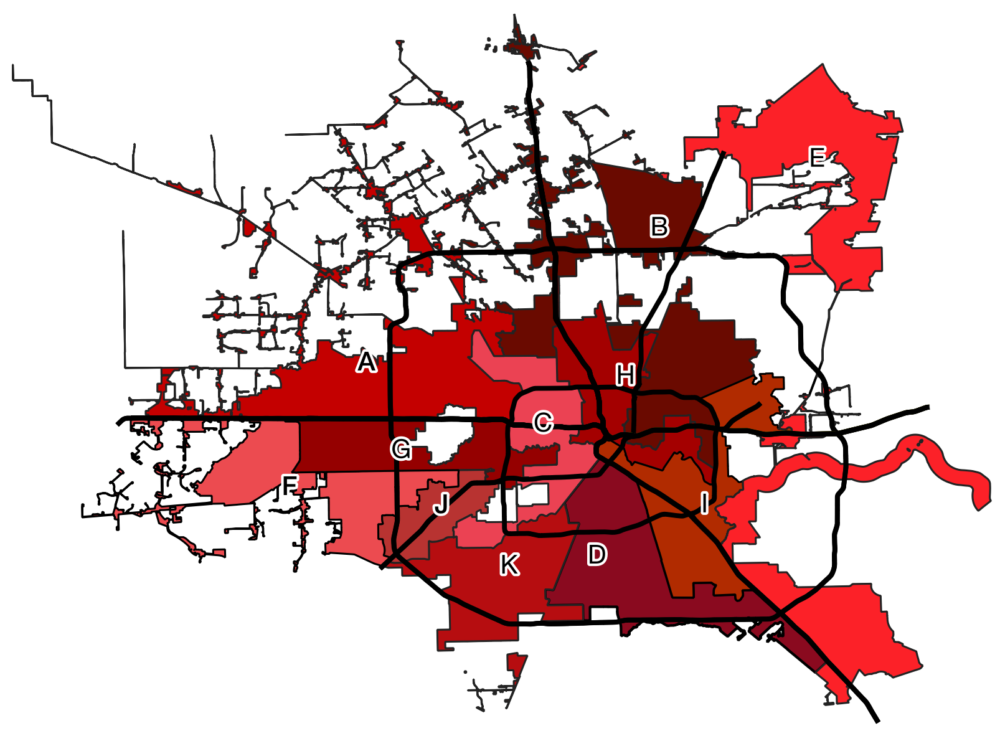 City Council District Map for the City of Houston
City Council District Map for the City of Houston
The survey contained seven questions about flooding and flood control, including building in the 100-year floodplain, disclosure for renters and if climate change should be addressed in flood mitigation planning. More than two-thirds of candidates responded.
Early voting runs from Oct. 21 through Nov. 1, with Election Day on Nov. 5. On the ballot: all 16 seats on Houston City Council. Five of those seats are at-large positions that all Houstonians vote for, while the other 11 seats are geographic districts that appear on the ballot depending on where you live.
The full list of candidates running for City Council is available, here. To find out which council district race you’ll be voting in, you can enter your address on this map.
Here’s what over 70 candidates had to say about flooding — and how to fight it. You can jump to your district by selecting it from the dropdown:
District A

Mehdi Cherkaoui
“I’m not a politician. I am an attorney who wants to represent district A in City Hall and use common sense, business experience and proven advocacy skills to fight against government waste, inefficiencies, invest in flood mitigation and enhance public safety. I am the only candidate who pledged NOT to take donations from special interest and city contractors. I am ONLY beholden to the voters.”
- Do you support new construction in the 100-year floodplain?
No. - Would you support strengthening the minimum water detention requirements for development projects?
Yes. - Would you support requiring landlords to disclose a property’s flood risk to potential renters?
Yes. - Do you believe a comprehensive flood mitigation plan needs to address climate change? If yes, how?
Yes. Storms are getting stronger and rainfall is getting heavier. We cannot as a city address flooding unless we have a comprehensive conversation about climate change. - What would you do to increase the affordable housing stock outside of flood-prone areas?
Encourage and facilitate development of low cost housing by incentivizing builders and developers to cater to this segment of our population. - How can the city improve its emergency response during natural disasters?
First, the City needs to raise awareness about proper preparedness during natural disasters. Second, City leadership has to keep citizens aware of updates, evacuation routes and then mobilize its resources to conduct rescue operations in collaboration with the county and volunteers. Keeping lines of communication through phones and social media is also crucial. - How can the city and county work more closely to provide a unified flood mitigation plan?
The City must plan bigger storm water detention projects and new infrastructure in collaboration with the County’s flood control district. However, in light of the State of Texas’ latest decision to take control of over $4 billion of flood prevention away from the City and the county, it is clear that both City and County leaders have failed to work together with respect to flood mitigation.

Amy Peck
“With over a decade of experience in resolving constituent issues, Amy knows what it takes to find solutions, navigate complicated governmental agencies and get results. As chief of staff for Council Member Brenda Stardig since 2014, she has already been serving the citizens of District A. Amy has a unique understanding of the needs of the district and will continue advocating for the community.”
- Do you support new construction in the 100-year floodplain?
No. The current Floodplain Ordinance is not sufficient. It does not address the real issues we see in our community. I support responsible development, but the City needs to get the ordinances right before any more development should happen in the floodplain. I am committed to getting the ordinances right to make sure we are developing responsibly and not borrowing against future generations. - Would you support strengthening the minimum water detention requirements for development projects?
Yes. What the City is doing now is not working. We need to strengthen the detention requirements, and the City needs to work with all of the stakeholders to come up with meaningful solutions. It might not be a matter of only strengthening the detention requirements. We have to get creative to find ways to mitigate flooding, and I will do that. - Would you support requiring landlords to disclose a property’s flood risk to potential renters?
Yes. People have a right to know their risks before making decisions about where to live. - Do you believe a comprehensive flood mitigation plan needs to address climate change? If yes, how?
Let’s start with instituting a meaningful comprehensive flood plan of any kind first. We need to look at any factor that might impact flooding, but at this point, we know where the issues are and what projects we need to fix them. Let’s move forward on that before we spend more time addressing other elements. - What would you do to increase the affordable housing stock outside of flood-prone areas?
The City needs to make it a better business proposition for developers to be interested in affordable housing. In order to do this, we need to streamline the permitting process. I have proposed starting a Sunset Review Program where we do a thorough audit of every department, including the permitting department. Each department needs to justify their performance and their existence. - How can the city improve its emergency response during natural disasters?
District A had the only high-water rescue vehicle in the City during Hurricane Harvey because we prioritized funds for this. We need better equipment for our first responders. We also need to completely upgrade our 911 system. It was complete chaos during Harvey because the 911 system was not operating as it should. - How can the city and county work more closely to provide a unified flood mitigation plan?
I have already worked with the County on a project to mitigate flooding in order to expedite its launch and will continue to do so as the council member. We need to leverage funds from both entities. We also need to work on a plan for regional detention with both entities because flooding does not start and stop at the city limits.

Lois Dickson Myers
“3-Time Flood-Victim in past 10 Years, owned a home in District A for 41 years that never flooded before Developers built in our area causing hundreds of homes to flood, so studied to find why. A former Sr. English Teacher, turned small-business owner, Houston Realtor 40 Years, I see property values declining due to flooding: bad for economic stability of Community, but I’ve found Real Solutions to fix our flooding.”
- Do you support new construction in the 100-year floodplain?
No. Houston has allowed too much cement building on ground; passed Ordinance in Mar 2013 to increase by 4 TIMES the amount of building per each (1) acre, while PWE Dept said NOTHING about increasing drainage requirements to mitigate for displacement of rain — Recipe for Disaster! Led to massive flooding in COH’s 1300 Square Mi (incldg ETJs). More stringent drainage regs needed, as NOAA Atlas 14 Standards. - Would you support strengthening the minimum water detention requirements for development projects?
Yes! Developers need to put in/pay for Detention Ponds, above/below ground, on their own property to detain their own rain run-off displaced by their cement— instead of pushing it into homes/streets with inadequate Drains to Nowhere, causing flooding in Houston’s flat terrain. Also needed: Enforcement of COH Infrastructure Design Manual, Chpt 9, Detention Regs, which some Developers are violating. - Would you support requiring landlords to disclose a property’s flood risk to potential renters?
Yes. As a Realtor, I would advocate for this on state and city levels. - Do you believe a comprehensive flood mitigation plan needs to address climate change? If yes, how?
Yes! COH should adopt NOAA Atlas 14 drainage standards of 19.4 Inches of Rain in 24 Hr-Period in 100-year Flood Event — more stringent than COH standards based on “Area Measurement” (.5 Acre Feet of Detention per 1 Acre). NOAA standards are a “Volume Measurement”— Multiply .5 Ac Ft TIMES X number of Acres TIMES 19.4 Inches of Rain Divided by 12 Inches = the Number of Acre Feet of Detention Required. - What would you do to increase the affordable housing stock outside of flood-prone areas?
I do not understand your question. Overall, I do not believe building should take place in flood-prone areas, but “flood-prone” is a nebulous term. More specifics are required to answer this question. - How can the city improve its emergency response during natural disasters?
Have a Website or Text Messaging System to alert Residents where the Rain is moving to or from, and how many inches of Rain are falling or are predicted, and the time involved. - How can the city and county work more closely to provide a unified flood mitigation plan?
USACE should be over City/Co & implement USACE MasterPlan to fix Houston flooding. I met with Engineers USACE/Galveston May 2018 and wrote up their Plan on Website Form7001, submitted to ASA in DC; working with DC Legislators to put into WRDA Bills. USACE R Experts (Ex: Built Panama Canal connecting E to W Oceans of World.) But USACE can’t do a thing unless Congress appoints/appropriates them money.
Iesheia Wilson
“I am a recent graduate at Lone Star College-Cyfair Campus with a degree in Business Accounting. I am not new to helping the community. I am an active member of Carverdale Community Civic Club and attend other club meetings as well. I pride myself on being a hard worker, dedicated servant and a responsible leader. I’m ready to get to work for you.”
- Do you support new construction in the 100-year floodplain?
Yes. I also believe we need a new 500-year floodplain. We have to start working with the county and other entities to keep Houston from flooding. - Would you support strengthening the minimum water detention requirements for development projects?
Yes. Developers have to know and understand that if they are working on a project and the requirements have not been meet then they will be held accountable by either taking away their ability to bid on contracts for a while and pay back the funds they were given to do the project properly. We have to start accountability somewhere to ensure our water detentions requirements are met. - Would you support requiring landlords to disclose a property’s flood risk to potential renters?
Yes. Everyone needs to know if they are living in an area that floods or at risk for flooding. We have to start holding these landlords accountable and make sure they are providing the information needed to make families feel safe. For too long they have been getting away with doing nothing, but not on my watch. - Do you believe a comprehensive flood mitigation plan needs to address climate change? If yes, how?
Yes. We first acknowledge it. Once elected I am going to work with the organizations who are already on the ground fighting for climate change. We all need to start working together to fight flooding and climate change together. - What would you do to increase the affordable housing stock outside of flood-prone areas?
We need to look at the qualifications for affordable housing. We have to also make sure the families that are a part of this program will be able to afford the housing for the length of the loan. - How can the city improve its emergency response during natural disasters?
I think the plan we have is good, but one thing I would add is having the city and the school districts work together so we don’t put our kids in harm’s way like it has been done in the past. We have to start being proactive instead of reactive. - How can the city and county work more closely to provide a unified flood mitigation plan?
We have to meet and make plans together so we can make sure the communities of Houston are getting the best. We also need to bring the state in so we can all work for the betterment of Texas.

Marina Angelica Coryat
“Marina holds a BA in Government from Cornell University. She worked for the City of Houston for 21 years in the Mayor’s Office, Housing and the Solid Waste Management Departments. She is the Communications Director for a State Representative. She has also worked in the private sector and as an entrepreneur. Serves on the HAUL board. Graduate of Leadership Houston & the Center for Houston’s Future.”
- Do you support new construction in the 100-year floodplain?
Yes. No one can determine when and how an area will be affected. I would rather encourage construction in a 500-year floodplain zone but if there is not an option, I recommend that new construction be developed in a manner to raise elevation to prepare in the event of a flood. I also want new construction to not have an adverse effect on homes in the neighborhood by ensuring proper drainage. - Would you support strengthening the minimum water detention requirements for development projects?
Yes. As we have had more flooding recently, I would support strengthening the minimum water detention requirements. We do not need to have an adverse effect on neighborhoods and other properties due to recent development. - Would you support requiring landlords to disclose a property’s flood risk to potential renters?
Yes. I think potential renters should be informed. Let the renters make their own minds up if they want to risk the chance for flooding. - Do you believe a comprehensive flood mitigation plan needs to address climate change? If yes, how?
Yes. In fact, FEMA is encouraging communities to incorporate methods to mitigate the impacts of climate change. FEMA has developed initial guidance on mitigating flood and drought actions including green infrastructure methods, expanded ecosystem service benefits, and three flood reduction and drought mitigation activities. We should use this in our planning to reduce risks and increase resilience. - What would you do to increase the affordable housing stock outside of flood-prone areas?
I would work with the Mayor and the Housing & Community Development to obtain more Community Development Block Grant money to support affordable housing, especially for senior citizens. Additionally, we would work with other organizations such as the Houston Area Urban League who help address affordable housing issues. - How can the city improve its emergency response during natural disasters?
As one who worked at TranStar & HEC during disasters such as TS Allison/Hurricane Ike, City should make sure that its plans are current: emergency management, debris removal plans, evacuation, media & communications, & emergency contacts for staff that will have to work during the storm. There should be a coordinated effort between the city, county, schools & businesses to get folks home early. - How can the city and county work more closely to provide a unified flood mitigation plan?
There should be experts from both sides looking at how to address including a joint emergency flood notification system; infrastructure improvements to accommodate flow; a community education/outreach campaign; the preservation and improvement of open space in floodplains; constructing detention areas to minimize flash flooding events; and new regulations and building standards.
District B
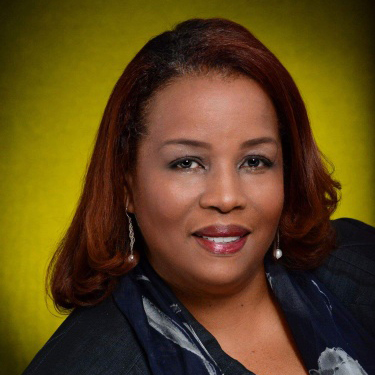
Huey German-Wilson
“I am currently a resident of Trinity/Houston Gardens, where I have lived for the last 10 years. I was raised in Trinity Gardens. I have been a grassroots advocate working on infrastructure, parks, libraries and food insecurity in my community. I have worked along with other community members/leaders to develop a community Farmers Market to increase fresh produce in the community.”
- Do you support new construction in the 100-year floodplain?
Yes. There have been so many instances of flooding in the last few years that there are places in the 100-year floodplain that weren’t there before. We can build to mitigate the issue of flooding. Increasing current parks, golf courses, gardens and detention basins to be utilized during flooding. - Would you support strengthening the minimum water detention requirements for development projects?
Yes. If we can be assured that these detention requirements are maintained adequately. There should be some way of mandating that these requirements live on for a considerable period of time. - Would you support requiring landlords to disclose a property’s flood risk to potential renters?
Yes. Residents should not be subjected to moving into property that isn’t properly repaired. If landlords are required to disclose the possibility of flooding they will be more apt to properly repair the property and mitigate for flooding to make their property more marketable. - Do you believe a comprehensive flood mitigation plan needs to address climate change? If yes, how?
Yes it does need to address climate change. We need to try to live in our communities with the risk of some flooding and strategic plans to work around. - What would you do to increase the affordable housing stock outside of flood-prone areas?
I would utilize some of the existing housing stock, bring it up to code around individual communities. This housing method can add valuable units to each community. - How can the city improve its emergency response during natural disasters?
The city can improve its emergency response during natural disasters by planning for flooding, making strategic plans for emergency housing and emergency evacuation. It would be helpful if the city would use the MSC to house people in each community on a temporary basis. Residents need to be close to their home and have access to services to recover as quickly as possible after a disaster. - How can the city and county work more closely to provide a unified flood mitigation plan?
Both the city and the county can work on improved drainage across the community and the county can work to ensure that the bayous and detention areas can handle the processing of water once it reaches those channels. A concerted effort to develop mass plans sensitive to each community based on need. By using a grid system to identify low lying areas and address those around the community.

Alice Kirkmon
“My name is Ms. Alice Kirkmon and I am a proud resident of the Kashmere Gardens and 5th Ward community. I was born and raised in this community and have remained here and raised my children here. I was honored to attend Prairie View A&M University where I majored in Business and minored English.
I own several businesses in the community and run an early childhood development center.”
- Do you support new construction in the 100-year floodplain?
No. The city is growing, so I see both sides of the issue. We want to thrive and grow as a community. However, we must consider the effects flooding has on families and individuals who will be future victims if we build in the the 100-year floodplain. - Would you support strengthening the minimum water detention requirements for development projects?
Yes. Water run-off is important to reduce potential flooding to streets and area homes. - Would you support requiring landlords to disclose a property’s flood risk to potential renters?
Yes. Renters need to be aware of where they live and the potential for flooding. It’s only fair that our citizens are allowed to make informed decisions about the places they call home. - Do you believe a comprehensive flood mitigation plan needs to address climate change? If yes, how?
I believe a comprehensive flood mitigation plan is one way the city is addressing climate change. Another way to do that is to create more green spaces. Everything we build can’t be concrete. If we want to have a future that won’t put us under water every time it rains, we need to think about creating parks and nature preserves. - What would you do to increase the affordable housing stock outside of flood-prone areas?
There are many ways to increase affordable housing, but one way is to give tax credits to developers for the acquisition, rehabilitation or construction of rental housing targeted to lower-income households. While cities don’t have control over how funding is handled, these programs have the potential to encourage private developers to build affordable housing. - How can the city improve its emergency response during natural disasters?
Along with the plans that the city has already put in place for natural disasters, we must reach out to the community. Houston is filled with people who will help their fellow citizens without hesitation. Incorporating various groups and volunteers into the natural disaster plan will allow storm victims to get the help they need faster. - How can the city and county work more closely to provide a unified flood mitigation plan?
The city and the county must focus on the end goal. That is to make Houston and Harris County places people want to continue to live, work and thrive. City and county leaders must identify the most serious overlapping problems and begin to come up with solutions for each issue. That is the only way to begin solving our natural disaster problems.

Tarsha Jackson
“I’m a proud product of Houston, having grown up in neighborhoods in District B. I’ve been fighting to advance the priorities of District B residents since the early 2000’s. I’ve built multi-racial alliances to secure bail reform, address immigrant rights, affordable housing and equitable recovery after Hurricanes Ike and Harvey. My advocacy work has been recognized locally and nationally.”
- Do you support new construction in the 100-year floodplain?
Yes. I am not opposed to development in the 100-year floodplain, especially given the need for more affordable housing, as long as the design is resilient and elevated. Almost 60% of flooding during Harvey occurred outside of any defined floodplain, so better floodplain mapping is key to anticipating and managing future flooding. - Would you support strengthening the minimum water detention requirements for development projects?
Yes. Developers helped get us into the mess of flooding we’re experiencing every year. They need to help get us out by doing their fair share to create more detention. We need more density to be resilient for the future, but we have to build smarter. - Would you support requiring landlords to disclose a property’s flood risk to potential renters?
Yes. Renters have so few protections when it floods. They need to know what the risks are so that they can protect themselves the best they can. - Do you believe a comprehensive flood mitigation plan needs to address climate change? If yes, how?
Yes, All our plans need to address climate change. We’re flooding more because of warming oceans that lead to bigger rainstorms. We’ll also start seeing an increase in population from climate refugees moving to Houston from other places that face extreme weather. - What would you do to increase the affordable housing stock outside of flood-prone areas?
We need innovative new models to preserve homes that are already affordable in neighborhoods that are gentrifying. I’m a supporter of the Houston Community Land Trust, which is helping create home ownership opportunities for people who wouldn’t otherwise be able to buy a home. - How can the city improve its emergency response during natural disasters?
District B has a huge problem with drainage. We need Public Works to make street-level drainage improvements and combat illegal dumping. But cleaning ditches isn’t enough. We need a much bigger effort to help people train and prepare for disasters of all kinds at the household level. And we have to take on land use in a big way if we really want to solve flooding in our region. - How can the city and county work more closely to provide a unified flood mitigation plan?
The neighborhoods in District B were hit hard during Harvey and the 2015 and 2016 floods. They also are some of the most likely in the city to flood in a heavy rain. It is absolutely critical that we increase investment in street-level drainage, connected to the County’s investments in bayou-level drainage.

Broderick F. Butler
“Broderick F. Butler is a native of Northeast Houston and a proud product of District B. He attended North Forest ISD; he graduated from Forest Brook Sr. High School. He went on to the University of Texas at Austin to complete a BA in Liberal Arts degree in Government. He has spent the past two decades engaged in government as a capitol staffer, state agency legislative liaison and contract consultant.”
- Do you support new construction in the 100-year floodplain?
Yes. I do, but only after adding requirements that these projects would be the last 25% of projects and that development in other non-flood prone areas be considered first. I would add additional fees and restrictions to developments to build projects that are more flood resilient. - Would you support strengthening the minimum water detention requirements for development projects?
Yes. I have stated that while the local government should do that, we must also solicit private developers to include flood mitigation projects in their commercial and residential developments going forward. - Would you support requiring landlords to disclose a property’s flood risk to potential renters?
Yes. Full disclosure specifically regarding flood risk will not sway the majority of people, but with that knowledge a few can make a more informed decision. - Do you believe a comprehensive flood mitigation plan needs to address climate change? If yes, how?
Yes. Climate change is a real issue related to weather in Houston. Stronger storms are more frequent leading to more flood damage. Southeast Texas must consider how the climate change affects future disaster projections. - What would you do to increase the affordable housing stock outside of flood-prone areas?
I would cease development in Houston’s 10 most flood prone areas. I would recommend development in areas that are less flood prone. I would offer some incentives for developers to build in less flood prone areas. I would also strongly request more public input on the new home elevation rules to be more realistic and practical regarding application. - How can the city improve its emergency response during natural disasters?
The City, County & State need to create a Catastrophic Flood plan with clear roles for each. There must be scenarios that lay out scenarios for citizens. Funding needs to be increased for rapid response and first responders to purchase the gear and receive training in water rescues. - How can the city and county work more closely to provide a unified flood mitigation plan?
The city needs a comprehensive plan with the county accessing the scope of the problem with short-term & long-term solutions; short term quick fixes from 0-5 years & long-term fixes 5+ years. Without a comprehensive joint effort Houston & Harris County, both will continue to work at cross purposes and further endanger citizen’s lives and property, by not viewing the issue as an “all hands of deck” problem.

Karen Kossie-Chernyshev
“I am a native Houstonian, wife, mother, and tenured college professor. I was educated in North Forest Independent School District, and I earned BA, MA, and PhD degrees from Rice University. I am running for public office to help bring out the best in District B. I want to secure better city services, drainage, flood mitigation, roads, sidewalks, and promote sound-minded economic progress.”
- Do you support new construction in the 100-year floodplain?
Yes. I support new construction in the 100-year floodplain; however, such construction must take the possibility of flooding into account. New construction should be built at a higher elevation and include adequate drainage and detention ponds. - Would you support strengthening the minimum water detention requirements for development projects?
Yes. Given Houston’s ongoing problem with flooding, it is absolutely important to strengthen the minimum water detention requirements for development projects. Not to do so would be irresponsible. - Would you support requiring landlords to disclose a property’s flood risk to potential renters?
Yes. I would support landlords’ disclosing a property’s flood risk to potential renters. Landlords should want potential renters to make an informed decision about whether or not to rent. Having such information may also help them determine whether or not to purchase insurance. - Do you believe a comprehensive flood mitigation plan needs to address climate change? If yes, how?
Yes. A comprehensive flood mitigation plan must address climate change, as research has proven that there is a direct correlation between global warming and increased flooding. - What would you do to increase the affordable housing stock outside of flood-prone areas?
To increase the affordable housing stock outside of flood-prone areas, I would promote offering construction and purchasing incentives to developers and those who need affordable housing respectively. - How can the city improve its emergency response during natural disasters?
The city can improve its emergency response during natural disasters by preparing for them before they come. This includes identifying the risks associated with the particular disaster; reviewing insurance policies to see what they cover; having emergency response teams already on standby in critical areas already on to address needs as they arise; and having a written recovery plan in place. - How can the city and county work more closely to provide a unified flood mitigation plan?
The city and county can do the following: (1) identify the areas related to flood mitigation that each addresses, (2) explore ways to expand, combine, or streamline services according to the desired goal or objective.
District C

Rodney Hill
- Do you support new construction in the 100-year floodplain?
Yes, if it complies with the new requirements for elevating structures above the floodplain estimated water levels, with the structure having a flood venting system as per city code. - Would you support strengthening the minimum water detention requirements for development projects?
Yes. Anything that curbs developers from building with reckless abandon and requires flooding issues to be at the forefront of any new project is a good thing. - Would you support requiring landlords to disclose a property’s flood risk to potential renters?
Yes. I don’t believe that needs an explanation. - Do you believe a comprehensive flood mitigation plan needs to address climate change? If yes, how?
I believe our weather patterns are changing. Not sure why. I believe that we are in a period of some warming of the oceans and our gulf is producing more storms that form late and settle on the Gulf Coast as tropical depressions, which sit over us and produce massive amounts of rain. Our mitigation plan needs to be big. We must find a way to move this water out of Houston to the Gulf of Mexico. - What would you do to increase the affordable housing stock outside of flood-prone areas?
I’m not sure we have any “outside flood prone areas”. - How can the city improve its emergency response during natural disasters?
It’s not that easy. These disasters we are experiencing come with such uncertainty; even if you had a full fleet of emergency trucks and equipment there is a good possibility you couldn’t even deploy them effectively or get people to them. I think the city has done as good a job as could be expected given the circumstances dealt them. - How can the city and county work more closely to provide a unified flood mitigation plan?
We need to think big on this flooding situation. We need to get all our local state and federal partners together and hire hydrological engineers and work out a plan to build an aqueduct from the southeast of downtown from the ship channel to the Gulf of Mexico and get these floodwaters out of Houston. Most of our bayou/drainage funnels to the ship channel. Aqueduct it straight south to the Gulf.

Michelle Ganz
- Do you support new construction in the 100-year floodplain?
No. I think it is important that when we are building anywhere in the city that we build responsibly and find out how that building is going to affect the neighborhood it is being built in. I call it responsible building and it is part of my Multi Economic Neighborhoods Plan. With climate change bearing down on us, it is important that we proceed knowledgeably about ways to mitigate future flooding. - Would you support strengthening the minimum water detention requirements for development projects?
Yes. Water detention is part of responsible building. - Would you support requiring landlords to disclose a property’s flood risk to potential renters?
Yes. I support integrity in all forms of human interaction. This means I support ethical business practices. - Do you believe a comprehensive flood mitigation plan needs to address climate change? If yes, how?
Yes. We need to first do the easy things like make sure our drains are clean and free of debris. I watch people blow leaves and all kinds of debris into the streets when doing yards, and that debris many times clogs up our drains. Also, we need to update and improve our drainage systems. We need innovative and responsible building so we are not pushing the floodwaters off with cement. - What would you do to increase the affordable housing stock outside of flood-prone areas?
My Multi Economic Neighborhoods Plan does just that. I plan on giving incentives to builders that are willing to build low and middle-income housing. I will give incentives to landlords willing to rent on a sliding scale for low and middle-income earners, so they do not pay more than 30% of their income. When the landlords apply for the incentives they will have to be renting legally or be fined. - How can the city improve its emergency response during natural disasters?
First, we need to update as much of our outdated equipment as we can and put the rest on an update and maintenance schedule. Next, we need to continue training our people. Also, we need to make sure our communication between all levels of emergency response is on point. Lastly, we should partner with citizen groups like the Cajun Navy. - How can the city and county work more closely to provide a unified flood mitigation plan?
Communication is the key to working together with anyone. It is important to have constant and clear communication.
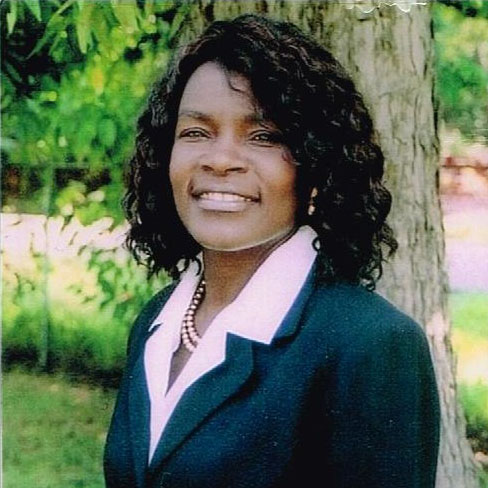
Gladys House
“Native Houstonian. Educated in public schools and college. Staunch supporter of Freedman’s Town and neighborhood justice throughout Houston. Taxation without representation unacceptable.”
- Do you support new construction in the 100-year floodplain?
No. Developers run the mayor and council, and flooding is due to no controls on them. Trees, grass and earth removed for so-called concrete development. How much money/development is enough? - Would you support strengthening the minimum water detention requirements for development projects?
Yes. But not at the cost of Earth. Recycle existing buildings for once in Houston. - Would you support requiring landlords to disclose a property’s flood risk to potential renters?
Yes. Homebuyers also. During housing construction, if there’s heavy rain, as soon as the rain stops, construction resumes. Mold is then sealed into that structure and the new homeowner is unaware of the deadly respiratory effects. Everyone must be made aware. - Do you believe a comprehensive flood mitigation plan needs to address climate change? If yes, how?
Address Houston, Harris County flooding first. Little can be done to alter climate. - What would you do to increase the affordable housing stock outside of flood-prone areas?
Restore existing housing stock, build only where raw land has been for years, and respect history/heritage there at that location. - How can the city improve its emergency response during natural disasters?
Train neighborhoods on prevention and safety drills three times prior to disaster seasons and for use for any and all natural disasters. - How can the city and county work more closely to provide a unified flood mitigation plan?
First, include the neighborhoods’ input. Conduct public input sessions and produce a draft that will be later reviewed and approved by Houstonians.
Daphne Scarbrough
“Life long Houstonian, independent business owner since 1982, community activist for architecture preservation, neighborhoods, transit, lower taxes, green space, organic gardening, replacing infrastructure, flooding remediation.”
- Do you support new construction in the 100-year floodplain?
No. I want to see the new flood maps and then we can accurately make decisions about where to build or not. - Would you support strengthening the minimum water detention requirements for development projects?
Yes. There is detention, retention and underground drainage that should be going to the nearby creeks and bayous. Each area needs to be considered on an individual basis when it comes to dealing with the flow of water and which method works best. - Would you support requiring landlords to disclose a property’s flood risk to potential renters?
No. Depends on how the ordinance is written. There are apartments that are part of the City’s HUD projects that have flooded several times on the Northside, that would mean that the City would be required to disclose their own flooding. - Do you believe a comprehensive flood mitigation plan needs to address climate change? If yes, how?
Yes, stop pouring so much concrete, one of the largest producers of CO2 in our air. - What would you do to increase the affordable housing stock outside of flood-prone areas?
Refurbish some of our historical homes and buildings that would qualify. - How can the city improve its emergency response during natural disasters?
Having a checklist plan that involves the Public Works department checking drains, making certain that City vehicles are not left in underground parking and appointing City employees to check the City buildings adjacent to Buffalo Bayou downtown for locked flood gates. - How can the city and county work more closely to provide a unified flood mitigation plan?
The City needs to provide the street drainage and the County needs to coordinate with them on getting the water flow to the bayous and creeks.

Kevin Walker
“I have been a resident of Montrose for the past 25 years. I was in the Marine Corps, followed by Ohio State and then got an MBA at UC Berkeley. I currently own several small businesses. I am running for City Council District C because I am frustrated with the city of Houston’s incompetence and lack of transparency.”
- Do you support new construction in the 100-year floodplain?
Yes. New construction in the floodplain must conform to current code and be elevated at least 1′ above the base flood elevation and not bring any net fill into the floodplain. We need to update the flood maps to accurately portray the situation as it is in reality. - Would you support strengthening the minimum water detention requirements for development projects?
Yes. We already have minimum detention requirements in the city of Houston, but the enforcement of these requirements needs to be strengthened. Large regional detention facilities would be more effective than a few tiny ponds when development occurs. - Would you support requiring landlords to disclose a property’s flood risk to potential renters?
Yes. Absolutely. - Do you believe a comprehensive flood mitigation plan needs to address climate change? If yes, how?
Yes. The storm size and recurrence and floodplain determination need to be continuously updated to reflect the higher frequency and larger storms that we are experiencing. We need to collect data to ensure the most accurate forecasts. - What would you do to increase the affordable housing stock outside of flood-prone areas?
I would promote the use of LIHTC (Low Income Housing Tax Credits) to encourage new affordable housing development. - How can the city improve its emergency response during natural disasters?
The city of Houston needs to develop an interactive communication system to work with and not against multiple facets of governmental (City & County emergency services & FEMA), non-governmental (Red Cross) and civilian organizations (Cajun Navy & HEB) to provide comprehensive emergency services to the most people in the timeliest manner possible to reduce redundancies. - How can the city and county work more closely to provide a unified flood mitigation plan?
I would recommend creating a joint task force including engineers from both groups to create a comprehensive master plan for the greater Houston metropolitan area.

Bob Nowak
“I am the City of Houston Webmaster, now in my 21st year. Before that, I was hired by the Chief of Staff of Mayor Lanier. For my entire career in public service, I have always worked with and among the highest levels of City government and their staffs. I have lived in the District C neighborhoods for the past 32 years.”
- Do you support new construction in the 100-year floodplain?
No. - Would you support strengthening the minimum water detention requirements for development projects?
Yes. - Would you support requiring landlords to disclose a property’s flood risk to potential renters?
Yes. - Do you believe a comprehensive flood mitigation plan needs to address climate change? If yes, how?
No - What would you do to increase the affordable housing stock outside of flood-prone areas?
Supply and demand has pretty much pushed affordable housing away from the collection of destination neighborhoods of District C. Our increase in property values/ assessments/taxes and new construction in mid-rise luxury apartments and mid- to hi-rise condos bear that out. I do, though, favor minimum lot standards. - How can the city improve its emergency response during natural disasters?
As a Tier One Essential City Employee, I respectfully decline to answer. - How can the city and county work more closely to provide a unified flood mitigation plan?
I will have a “One Stop Document Shop” on the District C website, which will monitor progress and spending of flooding projects that affect our neighborhoods, including City or County project manager contact information. Transparency is key to making sure our priority flood mitigation projects are being monitored and our tax dollars are being properly spent, from beginning to completion.
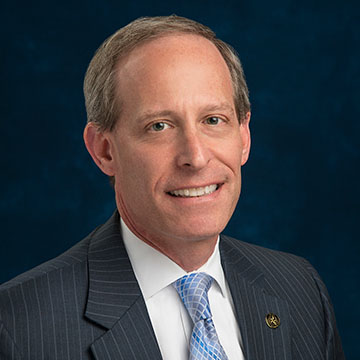
Greg Meyers
“Currently I am CFO for Kickstart Kids. I have had the opportunity to start and run a successful small business and had the honor of serving on the Houston ISD Board of Education from 2004-2016. While board president in 2010, I led efforts to implement a zero-based budget to close about a $100 million deficit.”
- Do you support new construction in the 100-year floodplain?
No. Despite Houston’s lack of zoning, new construction in the 100-year floodplain not only will create a potential disaster for the new owner, but could possibly create more flooding for nearby residents or business owners. - Would you support strengthening the minimum water detention requirements for development projects?
Yes. Several studies show that Houston is requiring an underestimation of detention needed for new developments. These studies continue to point out that the City needs to look at each project differently and take into account different terrains and soil as well when determining the amount of detention. - Would you support requiring landlords to disclose a property’s flood risk to potential renters?
Yes. Everyone should be made aware of the potential risks of living in an area that has been subject to previous flooding. - Do you believe a comprehensive flood mitigation plan needs to address climate change? If yes, how?
Yes. A number of local governments have explored opportunities for embedding climate change into their mitigation plans. While not yet required, these activities represent a policy innovation that can provide insight into how communities can meet existing FEMA requirements for pre-disaster mitigation planning while simultaneously considering how climate change could affect future hazards. - What would you do to increase the affordable housing stock outside of flood-prone areas?
We must work with state and federal lawmakers to make it easier to build more affordable housing. Houston is allocated to receive $1.15 billion in federal housing aid for low-income families. Houston also must use funds for the “unmet” housing needs of families whose lives and homes are still suffering from Harvey. In addition to this funding, the City can offer incentives to builders and occupants. - How can the city improve its emergency response during natural disasters?
A regional disaster master plan must be developed to coordinate entities to work together when a disaster happens. A big part of mitigating a potential disaster is educating the public on what is coming. Additionally, the City must take a preventive approach and clear storm sewers and secure contracts for debris removal before storms hit, not after. - How can the city and county work more closely to provide a unified flood mitigation plan?
In many cases, at times in the same watersheds, flood mitigation efforts are a patchwork of varying regulations that contradict each other. Additionally, the County often lacks enforcement authority for non-compliance with these regulations. The City and County should develop a master flood plan and work with the State Legislature to ensure that regional flood mitigation can be implemented.

Sean P Marshall
“I was born in Houston, attended HISD, earned undergraduate degrees at the University of Houston, and an MBA at Rice University. I am a VP at an Investment Bank where I advise clients on multi-billion-dollar Oil & Gas transactions. I am a director on a local arts organization board, a leader in my son’s Cub Scout troop, and a student liaison for Rice University. My wife and I have two children.”
- Do you support new construction in the 100-year floodplain?
No. Storm drainage infrastructure and Bayous are already at their limits and additional development would only exacerbate the problem. I will advocate for the prevention of residential development projects, the increase of green space in flood-prone areas and the use of environmentally friendly techniques in new and rehab construction projects through building code modifications and tax credits. - Would you support strengthening the minimum water detention requirements for development projects?
Yes. We should enhance our development standards in order to adapt to current and future flood exposure conditions. When increasing the population density of residential areas, we should require development to account for increased drainage not simply maintain prior capacity. - Would you support requiring landlords to disclose a property’s flood risk to potential renters?
Yes. Residents should have complete transparency when it comes to any potential risk of property loss and exposure to dangerous conditions. Landlords should be required to disclose all known past flooding events and future risks (based on most current floodplain maps) in lease agreements. - Do you believe a comprehensive flood mitigation plan needs to address climate change? If yes, how?
Yes, they should address the risks associated with climate change. They should be based on updated floodplain maps as well as potential risks of rising sea levels. It should focus on protecting our bayous, preserving green spaces and reducing the city’s carbon footprint. We cannot completely mitigate climate change, but we must minimize our contribution and prepare for its impacts. - What would you do to increase the affordable housing stock outside of flood-prone areas?
I will support ordinances that give tax credits and require developers of new housing projects to include a percentage of the dwelling units (10-15%) that can be sold or rented to households of low and moderate income. - How can the city improve its emergency response during natural disasters?
All citizens, businesses and public agencies need well thought out plans to deal with problems associated with floods. We have plans for hurricanes and fires. We need plans for flooding too. In the event of a flood stay off the road, close schools and businesses and go to shelters if your home is subject to flooding. The plans must be strictly adhered to and err on the side of caution. - How can the city and county work more closely to provide a unified flood mitigation plan?
The city and county should retain, expand and permanently fund the Storm Water Action Team (SWAT) Program in order to increase storm drain deliverability. Their flood mitigation building code modifications must complement one another. Developers should not be able to relocate projects from one jurisdiction to another in order to avoid mitigation requirements and increase profitability.

Shelley Kennedy
“I have a record of achievement as a community leader and advocate that yields results. Under the last two mayors, I have been appointed to City Commissions (KHB Commission & IPOB). I know one way to bring about change is by implementing effective policy. I am a policy wonk and budget geek. I’ve been fiercely advocating for Houstonians for decades and have been a driving force for positive change.”
- Do you support new construction in the 100-year floodplain?
No. Firstly, the new FEMA flood maps have not even been released. When you in-fill and add impervious surface in the 100-year floodplain, it adds more run-off and contributes to flooding downstream. We need to keep land in the 100-year floodplain as green space for use as water detention. - Would you support strengthening the minimum water detention requirements for development projects?
Yes. I support increased water detention standards. Current detention requirements barely address historical rainfall, not projected increases. They also do not adequately account for construction in-fill, rather just acre-feet of impervious surface. We need to require developers to include water detention for storm water that allows for impervious surfaces, in-fill and anticipated rainfall. - Would you support requiring landlords to disclose a property’s flood risk to potential renters?
Yes. The city should make an ordinance requiring disclosure of a property’s flood risk and flood history to potential renters. - Do you believe a comprehensive flood mitigation plan needs to address climate change? If yes, how?
Yes. We need to take significant steps to address climate change like improving walkability, public transportation and expanding greenspace. We also need to incorporate the flooding realities climate change has brought to Houston into our near-term infrastructure planning. Storm barrier solutions like the Ike Dike and/or infrastructure projects like the Ship Channel expansion are needed. - What would you do to increase the affordable housing stock outside of flood-prone areas?
The first step is to change the conversation around it. People believe affordable housing brings crime to their neighborhood. However, affordable housing is about opportunity, not entitlement. People who need affordable housing are your aunt or grandmother, police and fire cadets, teachers, or single mothers with two children. - How can the city improve its emergency response during natural disasters?
We need the city and county working together in a cohesive emergency evacuation plan as well as shelters and housing for flood refugees. We must improve the warning systems to alert residents along our bayous and waterways when significant water releases will be made upstream. - How can the city and county work more closely to provide a unified flood mitigation plan?
We must work directly with the county on projects and policies to improve drainage, expand watersheds and coordinate public works projects. The city cannot adequately address flooding control and mitigation on its own. Most of the systems and authority lies with the county. I propose a joint city-county, multi-departmental, multi-jurisdictional Flood Plan and Authority.

Abbie Kamin
“I’m a civil rights attorney and neighborhood advocate. As Associate Regional Director at the Anti-Defamation League, I fought discrimination, hate and gun violence. In my neighborhood, I’ve helped increase police patrols and improve local drainage. On City Council, I’ll fight for timely trash and recycling pickup, safe streets and sidewalks, and the highest standards of flood protection.”
- Do you support new construction in the 100-year floodplain?
No. I would not prevent people from rebuilding their own homes, but I do not support new construction in the 100-year floodplain. District C contains some of the hardest-hit areas from the last three major floods: Harvey, Tax Day and Memorial Day. Many also suffered from flooding in Imelda. With the impacts of climate change accelerating, we must change the way we develop land in our city. - Would you support strengthening the minimum water detention requirements for development projects?
Yes. As we have seen repeatedly in recent years, the frequency and severity of storms is increasing rapidly. Houston, however, is flat – and without adequate detention to allow stormwater to drain in an orderly manner, people’s homes will continue to flood. - Would you support requiring landlords to disclose a property’s flood risk to potential renters?
Yes. I have called for this requirement as part of my comprehensive flood protection plan at www.AbbieKamin.com/flooding. When a person purchases a house, we have procedures (required by lenders) for inspection and evaluation that could uncover previous flood damage to the buyer. No such requirements apply to renters. Renters should be made aware of a property’s flood risk. - Do you believe a comprehensive flood mitigation plan needs to address climate change? If yes, how?
Absolutely. My comprehensive flood protection plan starts with a call to vote against elected leaders who deny climate change. As the energy capital of the world, Houston should be leading the way on climate change. For example, I have called publicly for METRO to power its fleet with renewable energy, and I have called on our local energy sector to lead in renewable energy as well. - What would you do to increase the affordable housing stock outside of flood-prone areas?
Most immediately, I support using a significant portion of federal funds for Harvey relief to expand our affordable housing stock. Over the long term, I’m encouraged to see progress by Houston’s Community Land Trust, which sells homes at below-market rates to people who lease the land on which the houses are built. It helps build long-term, generational wealth without expensive, ongoing subsidies. - How can the city improve its emergency response during natural disasters?
I have hands-on experience with hurricane emergency response and recovery efforts from Hurricanes Katrina and Harvey. I want to acknowledge the phenomenal job of our city workers and first responders during Harvey. We are already applying lessons learned, by more rapidly pre-positioning resources in advance of storms like Imelda. We must continue to update our city’s emergency response plan. - How can the city and county work more closely to provide a unified flood mitigation plan?
While more work needs to be done, steps are being taken. For example, the city is advancing funds to the county flood control district to speed up the completion of Project Brays. Yet, we have been slow to recognize that flooding is a regional issue that requires a regional approach. I would support a formalized process for a unified plan between other levels of government.
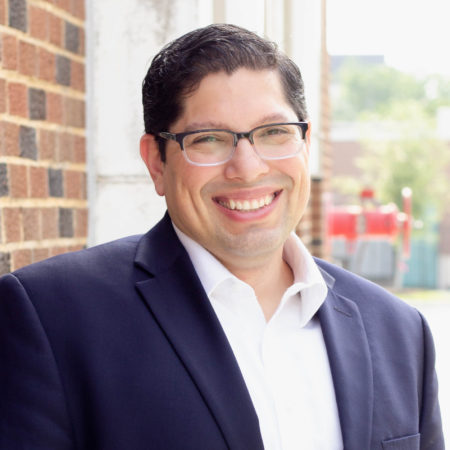
Candelario Cervantez
“I came to Houston from Wharton to attend college – eventually becoming one of the first in my family to earn a bachelor’s degree followed by being the first to attain an MBA at the University of St. Thomas. I started my career here in the District by working at the Museum of Fine Arts, Memorial Hermann, Rice University and Teach For America as a National Diversity, Equity, and Inclusion Executive.”
- Do you support new construction in the 100-year floodplain?
No. We need to ensure we are protecting our community members and putting them above everything else. - Would you support strengthening the minimum water detention requirements for development projects?
Yes. We have done some work in this space already but given the current climate we need to do more to protect our communities and have more investment from our developers. - Would you support requiring landlords to disclose a property’s flood risk to potential renters?
Yes. This is an equity and transparency issue. We need to ensure all community members have this information to help better protect them and make sure they can make informed decisions. - Do you believe a comprehensive flood mitigation plan needs to address climate change? If yes, how?
Yes. We must continue to have these conversations and lead the way for the country on how we can do this. First thing we need to do is start leveraging the Climate Action Plan and work closely with all the partners involved. - What would you do to increase the affordable housing stock outside of flood-prone areas?
We need to work more closely with our apartment owners and other developers. It will also require us working with the Low Income Housing Tax Credit (LIHTC) program to see how we can work to get these benefits applied to some of our existing units. We also need to message who will benefit: our seniors, teachers, school employees, city employees, young professionals and those in the greatest need. - How can the city improve its emergency response during natural disasters?
We need to continue doing what we have started to do after Harvey: invest in equipment and trainings for our public servants. We also need to make sure our community members have access to the resources before, during and after an event such as enrollment in the STEAR program for our most vulnerable and ensure people have access to Ready Harris resources. - How can the city and county work more closely to provide a unified flood mitigation plan?
We need to continue and increase what we are currently doing. We need to have constant communication work more closely together on CIPs and other projects that will impact the city and the rest of the county. We have a lot of opportunity to maximize our budgets and to make greater impact if we keep building and working with each other. It’s our role to inform teams on the needs of the community.

Amanda Wolfe
“I’m a lifelong activist, particularly in Houston — as a historic preservationist, LGBTQ advocate, pro-transit campaign manager, co-founder of the Women of Montrose Action Network, equal-rights/immigration-rights activist, and much more — I’ll respect the available space here, or I could go on for a while.”
- Do you support new construction in the 100-year floodplain?
No. Absolutely not. This is and should be our primary issue to tackle, and our past Wild-West attitude toward development is wrecking our city. - Would you support strengthening the minimum water detention requirements for development projects?
Yes. Unchecked development is one of my biggest causes. (See below) - Would you support requiring landlords to disclose a property’s flood risk to potential renters?
Yes. Renters are a major part of our city’s workforce and economy, and deserve to know what they’re getting. Landlords — and realtors and developers — must be required to let residents know what they’re getting into. - Do you believe a comprehensive flood mitigation plan needs to address climate change? If yes, how?
Absolutely. First, I believe that new developers should be subject to an Infrastructure Fee to address and remediate the issues that come with building multiple and multi-level new residences on single-family lots, particularly in older neighborhoods. Second, Houston and the Gulf Region have been the source of too many disasters involving pollutants, and I’d hold corporations accountable. - What would you do to increase the affordable housing stock outside of flood-prone areas?
I speak out in favor of giving monetary incentives/tax breaks to landlords and other property owners to provide affordable housing to all residents, particularly if those housing units are easily accessible to public transit. Every Houstonian deserves a home. - How can the city improve its emergency response during natural disasters?
We need to first address the people and neighborhoods we’ve failed during natural disasters (particularly during evacuations), and ensure that we never fail them again. The city absolutely must work with and communicate with underserved communities first, particularly with residents that may have financial limitations, mobility issues, or any other barriers to their safety. - How can the city and county work more closely to provide a unified flood mitigation plan?
Communication. It all comes down to communication. I’d assemble a commission of unbiased experts, including everyone from civil engineers to neighborhood-group leaders, to conduct studies and maintain that communication. I will also communicate with them on a regular basis, particularly in areas like Meyerland and other neighborhoods that have suffered terribly during floods, and work together.

Mary Jane Smith
“I am Mary Jane Smith, a native Houstonian. I am a wife, a mother and a grandmother. I am a graduate of Maryville University in St. Louis, Missouri. My husband and I raised our four children in District C where I started and ran a successful political consulting business for over two decades and retired two years ago. I had the time to look at the city I dearly love and did not like what I saw, and so I decided to run for City Council.”
- Do you support new construction in the 100-year floodplain?
Yes. I support construction in the 100-year floodplain, providing developers/builders adhere to all legal requirements. Houston response to Harvey – re-tooling Ordinance 19 – was hastily conceived and implemented. Once the HCFCD and various entities charged with the re-implementation of new flood maps are completed, we will, hopefully, have a better idea of the flood potential in the greater Houston region. - Would you support strengthening the minimum water detention requirements for development projects?
Yes. With three major floods in five years, we are obviously experiencing changing weather patterns. Given the growth and urban development in our region, resulting in less green space/more concrete, it is obvious the city and county need more water detention facilities in areas where flooding consistently occurs. - Would you support requiring landlords to disclose a property’s flood risk to potential renters?
Yes. It’s the fair thing to do. Potential buyers should always know what they are buying. This is basically The Texas Lemon Law, applied to land/home owners. - Do you believe a comprehensive flood mitigation plan needs to address climate change? If yes, how?
Yes. Changing Weather patterns need to be considered as well as historical data on area flooding. Our aging infrastructure needs replacement. Political decisions should not be the criteria for solving flooding problems. Changing weather patterns, sound engineering and historical data should be the bedrock for solving our flooding issues. - What would you do to increase the affordable housing stock outside of flood-prone areas?
Houston needs more transparency in our city financing so we can all see what is currently spent and what is available on affordable housing, as well as on all city funded projects. Once that is established, our city leaders need to forge more public/private ventures in affordable housing. - How can the city improve its emergency response during natural disasters?
Better communication between all involved. First responders need the best technical equipment available to protect citizens. Public safety is our highest priority. In Harvey, city leaders mistakenly told firefighters to go home. They were needed for rescues and medical assistance. Our Police Department is 1,500 officers below where we were 15 years ago. - How can the city and county work more closely to provide a unified flood mitigation plan?
Better communication between county/city/state. By working together on infrastructure improvements, taxpayers save up to 20%. This joint effort has successfully been done in several areas of the city. By doing this, only one set of permits is needed, one set of engineering drawings are needed, etc. This is why both County Commissioner Jack Cagle and Steve Radack have endorsed me. They know I will work with them to cut costs and better serve our constituents.
District D

Andrew C. Burks, Jr.
- Do you support new construction in the 100-year floodplain?
Yes. In the 100-year flood plain, New Construction sites must be built with larger drainage pipes. In the 100-year floodplain, all new construction requires elevated foundations. This will cause water to drain down to existing properties. This flow of water must be redirected away from the existing neighboring sites. Large Drainage Pipes must replace all existing water lines in the streets. - Would you support strengthening the minimum water detention requirements for development projects?
Yes. New Construction always causes flooding problems. Deeper Retention Ponds are important in keeping water out of existing communities. - Would you support requiring landlords to disclose a property’s flood risk to potential renters?
Yes. If you are moving to any community, you should know if the area floods. This information should be a requirement. - Do you believe a comprehensive flood mitigation plan needs to address climate change? If yes, how?
Dry or Hot climates historically cause materials to expand and colder climates cause materials to contract. Standing flood water has the same effect to materials used in retaining water during these temperature changes. - What would you do to increase the affordable housing stock outside of flood-prone areas?
As your City Councilmember District “D”, I would not allow the development or additional building of affordable housing just anywhere. I also would place stronger and greater liabilities on the builders and owners of these Affordable Housing Facilities. New Affordable Housing would not be permitted in flood prone areas. - How can the city improve its emergency response during natural disasters?
1. Prevent flooding on our streets. 2. Design and designate Emergency routes for all Emergency responders in times of natural disasters. - How can the city and county work more closely to provide a unified flood mitigation plan?
I would work hard to have more Intra-Local Agreements between Harris, Galveston, Fort Bend, Brazoria, Montgomery County and the City of Houston. This saves money and better utilizes resources.

Ken Moore
“Ken obtained his Bachelors of Science in Political Science from Kennesaw State University, Doctorate of Jurisprudence from Texas Southern University’s Thurgood Marshall School of Law and Master of Laws in Health Law from the University of Houston Law Center. Ken feels the District needs a leader who will place an emphasis on constituent services with a comprehensive plan to get things done!”
- Do you support new construction in the 100-year floodplain?
Yes. Our city is growing and needs development, but we just have to be careful and strategic in how we develop and include green space and trees around our development projects to ensure proper drainage and that the water has somewhere to go. - Would you support strengthening the minimum water detention requirements for development projects?
Yes. - Would you support requiring landlords to disclose a property’s flood risk to potential renters?
Yes. Everyone should know what they’re getting when renting property. The most important tool in keeping people safe is ensuring that they are well informed to make the best decision for him/herself and their family. - Do you believe a comprehensive flood mitigation plan needs to address climate change? If yes, how?
Yes. Although a federal issue, we can help at the local level by reducing our carbon foot print and supporting initiatives like “Metro Next.” Metro Next will help traffic congestion, which in turn will reduce the pollution in our city. Also, we need to ensure every dollar of Build Houston Forward and the drainage fee goes to what its intended for. - What would you do to increase the affordable housing stock outside of flood-prone areas?
I would work on decreasing home owner insurance rates for people outside of flood-prone areas and provide some sort of tax incentive for affordable housing development outside of flood-prone areas. - How can the city improve its emergency response during natural disasters?
First, with our current level of ineptitude of dealing with the flooding issue, we must always error on the side of caution when closing roads/schools/businesses in favor of people’s safety. During Imelda, we waited too late to do so and tons of people were stranded or wondering if their children were okay. Also, the city and county must work closely together for the betterment of its citizens. - How can the city and county work more closely to provide a unified flood mitigation plan?
They must work together and come up with better risk communication and evacuation plans for all of the constituents in Houston. Communication is key when developing better hazard forecasting, early warning systems and emergency plans to save lives. It takes communication and cooperation. Also, working together on a regional plan with other cites and counties close by that have similar issues.

Travis McGee
“I’m a lifetime resident of district D as well as a 15-plus year productive community leader/ProActivist. As a Civic President, home owner, property owner, and business owner all in the same district I have a vested interest and a special kind of love for my community. I’ve spearheaded various projects such as sidewalks, drainage projects, speed humps, street lights and street reconstruction.”
- Do you support new construction in the 100-year floodplain?
No. You can and shouldn’t build anything on bad infrastructure. - Would you support strengthening the minimum water detention requirements for development projects?
Yes. All new projects must have a drainage plan. - Would you support requiring landlords to disclose a property’s flood risk to potential renters?
Yes. It should be mandatory and law that the landlord disclose any defects or problem the property has or had at one point. It should be very similar to Carfax and documented with the city. - Do you believe a comprehensive flood mitigation plan needs to address climate change? If yes, how?
Yes, long term, but preparation is key now because we can flood tomorrow without a storm or hurricane in the forecast. - What would you do to increase the affordable housing stock outside of flood-prone areas?
I would revisit the old HUD model in which it was based on income and on livable property, in which the government actual assisted residents financially in fixing the house. I will also advocate for more single family housing by giving the same tax abatements and incentives to build single family housing that should start at 75k vs 150k or 200k in areas below the poverty level. - How can the city improve its emergency response during natural disasters?
The city can improve it by simply preparing for it 365/24/7 before, after and during hurricane season. It has to be a partnership with the county to expedite the drainage projects as well as the response. Drainage fees and disaster funds must be used specifically for issues related to those things only nothing else. - How can the city and county work more closely to provide a unified flood mitigation plan?
The city and county must work together 365/24/7 before, after and during storms/hurricanes. They must combine man power and resources year-round to properly prepare for historical floods we have became known for yearly. The illegal dumping epidemic has to be picked up regularly also to prevent it from getting into our infrastructure and drainage system regardless, whether city or county.

Dontrell L. Montgomery
“I’m a 37 year old process improvement enthusiast. I have lived in District D for 35 years. I attended B.H. Grimes, Foster Elementary, Cullen Middle School, Ross Shaw Sterling and Texas Southern University. I’ve been working in transportation for the last 14 + years. In that time I’ve earned a Specialization in Project Management & Principles and certificates in leadership, management and more.”
- Do you support new construction in the 100-year floodplain?
No. Roads, parking lots, sidewalks and other pavements combine to create impervious surfaces that resist the natural absorption of water. The natural systems of grasslands and parks are very good at accepting rainfall. But when water hits pavement, it creates runoff immediately. That water has to go somewhere. So it flows wherever the grade takes it, People’s Homes! - Would you support strengthening the minimum water detention requirements for development projects?
Yes. Growth in Houston will continue and only lead to more runoff from the pavement of development projects. We are limited on the amount of open grassland to absorb large amounts of rain and therefore I would support strengthening detention water requirements. I would also support exploring storm water management techniques as an alternative to strengthening detention requirements. - Would you support requiring landlords to disclose a property’s flood risk to potential renters?
Yes. I am a big supporter of renters’ rights and would fully support any measure requiring landlords to disclose flood risk to potential renters. Dwellings should be a protected aspect of our lives, and full transparency about potential natural disaster risk should be at the heart of that protection. - Do you believe a comprehensive flood mitigation plan needs to address climate change? If yes, how?
Yes. When designing ways to control the flow of flood water, the idea of climate change can be used as a focal point in ensuring that designs are in-line with potential effects of climate change. Please understand, we CANNOT out-design weather; so even our best forward vision may be inadequate. - What would you do to increase the affordable housing stock outside of flood-prone areas?
I would look to areas that are already developed (meaning, there is already a considerable amount of pavement, brick or concrete). It could be an old abandoned commercial building or multi-family complex. If the commercial buildings can be re-purposed, we will create affordable living spaces within them. Deconstruction before demolition would be important. - How can the city improve its emergency response during natural disasters?
When we were kids, we participated in something called a fire drill at school. This drill was to prepare us in the event that there was a fire. The city needs to begin the process of natural disaster drills. If we start drilling now, in five years the process will be “OK”. In 10 years, the process will be “better”. In 15 years, the City can have one of the most proficient natural disaster drills anywhere. - How can the city and county work more closely to provide a unified flood mitigation plan?
We should look into getting the Harris County Flood control District and the Greater Houston Flood Mitigation Consortium to operate as one group.

Rashad Cave
“I am a change agent and influencer with over 13 years of business and people management experience. I am a City Council Liaison for the City of Houston’s Department of Neighborhoods, and own a small business in District D which employs District D residents. I am a lifelong resident of District D and grew up serving the community. I wish to continue this work in a higher capacity as Councilmember.”
- Do you support new construction in the 100-year floodplain?
Yes. As long as it is safe as determined by professionals and experts in the areas of construction and flood mitigation, I would likely support this construction. - Would you support strengthening the minimum water detention requirements for development projects?
Yes. In order to prevent loss of life and property, we must strengthen flood mitigation regulations. - Would you support requiring landlords to disclose a property’s flood risk to potential renters?
Yes. Many renters are transients who are less familiar with the area that they are moving into. This vulnerability makes renters especially deserving of a fair warning about any flood risks before renting. - Do you believe a comprehensive flood mitigation plan needs to address climate change? If yes, how?
Yes. Natural flora has a terrific ability to mitigate floods, but is too often razed to make way for new development. Increasing green spaces, planting trees and protecting sensitive lands will mitigate both flooding and climate change. - What would you do to increase the affordable housing stock outside of flood-prone areas?
I would work to provide incentives to developers that include affordable housing in their developments. - How can the city improve its emergency response during natural disasters?
The City can provide better training and equipment to its first responders. This will require cooperation between the city, county and state to make sure funding for this additional training is available. - How can the city and county work more closely to provide a unified flood mitigation plan?
The city and county can share the burden of simple, but important tasks, such as proactively clearing drains and purchasing appropriate response equipment. As often as high water comes, these simple steps should be taken immediately.

Carolyn Evans-Shabazz
“I am a native Houstonian raised in District D. I am a graduate of Jack Yates High School. I graduated with a B.A. from Spelman College in Atlanta, Georgia and I have a Masters and a Doctorate from Texas Southern University. I am currently the Chair of the Board of the Houston Community College.”
- Do you support new construction in the 100-year floodplain?
No. We should not support new construction in the 100-year floodplain until we make the city more resilient and make sure that we have proper drainage and therefore should not subject families to the devastation and the cost of millions of dollars to rebuild. - Would you support strengthening the minimum water detention requirements for development projects?
Yes. Strengthening the minimum water detention requirements would allow sufficient capacity to discharge the allowable release rate from the development and any storm water flowing through the property. - Would you support requiring landlords to disclose a property’s flood risk to potential renters?
Yes. Landlords should have the responsibility to disclose the flood risks to potential renters. Renters should be given the information so that they can make an informed decision regarding living in a property at risk of flooding. - Do you believe a comprehensive flood mitigation plan needs to address climate change? If yes, how?
Climate change alters characteristics of the atmosphere that affect weather patterns and storms and thus needs to be addressed in a comprehensive flood mitigation plan. - What would you do to increase the affordable housing stock outside of flood-prone areas?
Affordable housing is an abstract concept and the city needs to develop an affordable housing plan for the city. - How can the city improve its emergency response during natural disasters?
The city needs to clearly define an emergency plan and advise the citizens before it is needed. Resources must be identified and coordinated plans must be developed to improve emergency response to natural disasters. - How can the city and county work more closely to provide a unified flood mitigation plan?
Flooding is a regional problem. Therefore, coordination between the city and county must be addressed to provide a unified flood mitigation plan.

Nissi Hamilton
“I am an unapologetically African-American woman, who is 31 years old, married with 7 children. I have 3 degrees: one BS, two MBA’s and a doctoral learner. I am a national comedian and motivational speaker against violence. I am a survivor of human trafficking and homelessness. My mother was murdered and I have never met my father. I am an a orphan, a mother, and a veteran of the US Navy.”
- Do you support new construction in the 100-year floodplain?
No. These new constructions will flood within the 30-year life of the mortgage. There is no such thing as a 100-year floodplain. This is a gimmick for insurance companies to let homeowners know how they rate how much you should pay for insurance. Most of these new constructions are happening in District D. They cost 5 times the amount of an average house in my district. - Would you support strengthening the minimum water detention requirements for development projects?
Yes. You know what, there was a time where we actually cared about if our neighbors’ house flooded or not; or how much water was running off of your neighbors’ property into your own. The storms are going to become more severe and they are not cheap storms. If the water can’t permeate because of the ground’ then the new construction needs to pay two years of flood insurance for the homeowner or business. - Would you support requiring landlords to disclose a property’s flood risk to potential renters?
Yes. Don’t doctors tell patients when they have cancer and don’t they tell them what prescriptions to take? Don’t insurance companies tell consumers about the advantage and disadvantages of having certain liabilities that will affect their premiums? I don’t understand why they would be exempt from disclosing. They don’t get to limit the amount the house is discounted because it flooded out. - Do you believe a comprehensive flood mitigation plan needs to address climate change? If yes, how?
I don’t know how a flood mitigation plan would address climate change, but the climate change is addressing our need to have a plan for future flooding. We need a water-waste solution to protect us and our children! We have been out of compliance since 2005 and it doesn’t seem like anyone at the municipal level cares about it, but they don’t mind us paying a high water bill at the municipal level. - What would you do to increase the affordable housing stock outside of flood-prone areas?
It depends on what affordable is to the community outside of the flood prone areas. It seems that since my district is being lot-spliced and prostituted for its abundance of land, then, outside of it, we should have more foot traffic for tourism, more advanced advertising for the museums that are next to TSU and a hotel for visitors of the three major universities, especially during football season. - How can the city improve its emergency response during natural disasters?
By having more emergency response teams that work with other emergency response departments in Houston. I am a member of Team Rubicon and I respond to natural disasters with aiding personnel with food. I know how FEMA works and I have taken several FEMA classes. I think that all public servants should be trained on how to navigate thousands of people during a natural disaster. I know how to. - How can the city and county work more closely to provide a unified flood mitigation plan?
Since Lina Hidalgo, we are closer, but there are still some kinks. When the city got sued for not being in compliance, how come the county didn’t? Did they have a plan? Were their residents better off than ours? Do they ever not cap out of their budget? This question makes me think what are we doing wrong that the county isn’t doing because unity should have been established before my election.

Carla Brailey
“Dr. Carla Brailey is a native Houstonian, mother, Professor of Sociology at Texas Southern University, and the Vice Chair of the Texas Democratic Party. She served on Mayor Sylvester Turner’s transition team and led as the Executive Director for former Mayor Adrian Fenty’s Office of Community Affairs for constituent services. She is a graduate of Texas State University and Howard University.”
- Do you support new construction in the 100-year floodplain?
No. Until the city is able to adequately provide equity in building opportunities in the floodplain, I do not believe that homeowners should build in the area. The cost of construction regulations disproportionately excludes residents that are not in the financial position to build in the area. - Would you support strengthening the minimum water detention requirements for development projects?
Yes. As developers continued to build within the city limits and we have less and less green space, the City should enforce requirements on developers to mitigate potential damage caused by flooding, such as requiring detention basins for development projects to protect communities downstream and in surrounding neighborhoods. - Would you support requiring landlords to disclose a property’s flood risk to potential renters?
Yes. My first concern as a member of the City Council is constituents. I believe in full disclosure and transparency. The list of flooding events will continue to grow until we develop and adopt a more robust plan — until that time, we must protect the tenants that will be displaced due to these type of storms. - Do you believe a comprehensive flood mitigation plan needs to address climate change? If yes, how?
Yes, the first step in this process is to address climate change as real and align a plan with researchers’ conclusions that suggest storms are likely to get stronger, last longer, and cause more damage. I would like to start a task-force focused on investigating the impact of climate change on the city of Houston over the last fifteen years. - What would you do to increase the affordable housing stock outside of flood-prone areas?
As a city, we must recognize that the cost of living in affordable housing in the city is rising, and we must work together to create initiatives that will address economic disparities. The City should initiate other solutions regarding affordable housing. For example, old or abandoned buildings can be redesigned to become residences (example: Rice Hotel). - How can the city improve its emergency response during natural disasters?
We must first locate areas of the city that are prone to flooding and take a multi-lateral approach to ensuring that residents are (a) educated; (b) aware; (c) prepared. One way to mitigate flooding is to create new green spaces. We need to make sure residents are aware of programs in the city such as “Adopt-a-Drain,” Build Houston Forward, and Alert Houston. - How can the city and county work more closely to provide a unified flood mitigation plan?
The City and the County should work collaboratively on overlapping projects such as roads, streets, parks, and drainage that affects residents.
District E

Dave Martin (Incumbent)
“Born in New Orleans, Louisiana and a graduate of Louisiana State University, Dave serves as a Managing Director of Marsh & McLennan Companies, Inc. Dave and his wife Julie have been married for 36 years. They live in Kingwood with their three children, David, Michael and Jennifer. They are active parishioners at St. Martha’s Catholic Church.”
- Do you support new construction in the 100-year floodplain?
No. I don’t support building in the 100-year floodplain because we are seeing flood events with more frequency. We can’t continue to build in areas that we know will flood, we need to be smart about development and get out of the 100-year floodplain. We need more Exploration Green type projects in the City that are functional parks serving the needs of the community while helping to reduce flooding. - Would you support strengthening the minimum water detention requirements for development projects?
Yes. I do support strengthening minimum water detention requirements because we need our developers to be a part of the solution. Developers must be held accountable for their runoff and impact that their lack of detention plays in flooding neighboring areas. - Would you support requiring landlords to disclose a property’s flood risk to potential renters?
Yes. Everyone should be aware of any potential risks where they live. - Do you believe a comprehensive flood mitigation plan needs to address climate change? If yes, how?
I believe a comprehensive flood mitigation plan needs to be developed whether you believe in climate change or not. More regional studies are needed to look at relationships between watersheds. We need to see all cities and counties crack down on developers and their detention/retention policies. We cannot keep sending water downstream with disregard for its effects on others. - What would you do to increase the affordable housing stock outside of flood-prone areas?
I don’t think affordable housing or any housing for that matter should be built in flood-prone areas. We need to help residents make informed decisions about where to live while reducing their risk of flooding. - How can the city improve its emergency response during natural disasters?
I think HFD and HPD do a fantastic job with the equipment they are given. I would like to see each Council District have their own fleet of emergency response vehicles or at least a partnership with other agencies to spread out equipment evenly. - How can the city and county work more closely to provide a unified flood mitigation plan?
A regional flood management plan is necessary, no one wants to be the reason why another area is flooded. Natural disasters don’t care what county you’re in, they devastate us all equally and we need to work better together on prevention and planning for resiliency.
Sam Cleveland
“I am a Houston Police Officer with a decade of experience. I hold a Master Peace Officer certification and a have Masters Degree in Criminal Justice Leadership and Management from Sam Houston State University. My background in public safety affords me a unique perspective on council, with the ability to push for effective change moving forward.”
- Do you support new construction in the 100-year floodplain?
No. New construction in the 100-year floodplain is a terrible idea. The only groups that will benefit from developing in a floodplain are developers. We need to focus on mitigating the risks to people who already live in the 100-year floodplain before we add additional developments. - Would you support strengthening the minimum water detention requirements for development projects?
Yes. I have seen firsthand the impacts of uncontrolled development and a developer’s failure to prioritize detention projects. Any new development should have a positive impact on flooding in order for it constructed. Detention systems should be required to accommodate all runoff that results from the development as well as have additional capacity to support adjoining areas. - Would you support requiring landlords to disclose a property’s flood risk to potential renters?
Yes. There are a number of mandatory disclosures for home sellers to make when selling a home. The disclosures include the flood history of the property, if it is located in a floodplain and a few other conditions defined by state law under SB339. If there is a requirement for a seller to disclose the potential flood risks to a buyer, why is it any different in a rental situation? - Do you believe a comprehensive flood mitigation plan needs to address climate change? If yes, how?
No. We need to develop a comprehensive flood mitigation that is within our scope of control. In order to effectively address climate change, we would need direct and responsive support from the state and federal government. That is not going to happen any time soon. Therefore, let’s focus on what we can control and develop our plans accordingly. - What would you do to increase the affordable housing stock outside of flood-prone areas?
I think before we look into increasing the affordable housing stock outside flood-prone areas, we need to address newly created flood-prone areas that are impacting existing affordable housing. Unfortunately, new development is significantly impacting our existing neighborhoods. This has lead to catastrophic flooding in neighborhoods that were previously unaffected by floods. - How can the city improve its emergency response during natural disasters?
My experience is that each department’s response plan is independent of other departments. I would develop and implement a combined response plan, where public works, HFD and HPD are all responsible for certain activities within the response plan. This would ensure effective communication and functional interoperability of our response efforts. - How can the city and county work more closely to provide a unified flood mitigation plan?
Harris County and Houston both have a mutual interest in reducing the risks of flooding. We need to focus on the jurisdictional issues that are limiting progress, and place responsibility for project completion on one entity. This lack of progress just cost the city and county control of $4 billion dollars.
District F

Jesus Zamora
- Do you support new construction in the 100-year floodplain?
No. The reason I do not support the construction is because it would hinder the development of businesses and homes within flood prone areas. - Would you support strengthening the minimum water detention requirements for development projects?
Yes. We see a prime example of what happened during Hurricane Harvey and the dams that had to be released due to the flooding that was unable to be contained. I will support stricter requirements for improving our water requirements. - Would you support requiring landlords to disclose a property’s flood risk to potential renters?
Yes. It is essential for landlords to ALWAYS disclose property that is located in a flood prone area to have all tenants prepared on flood emergencies. - Do you believe a comprehensive flood mitigation plan needs to address climate change? If yes, how?
Yes, I do believe Houston needs to take a more aggressive stance on climate change. Ensuring that we have a comprehensive plan in place with Emergency Flood Control departments to understand what we can do to prevent disaster flooding. - What would you do to increase the affordable housing stock outside of flood-prone areas?
We need a lot of work when it comes to housing stock. We see what happened during Harvey when a lot of small and large investor companies took advantage of the flooding and flipped a lot of those flood prone properties. We need to spread everything on an equal field to ensure all of our homes are on the same stock. - How can the city improve its emergency response during natural disasters?
My District was very fortunate to avoid a major flood when it came to Harvey. When I am elected, I will propose having emergency shelters in place and prepared for the alert of a natural disaster. I believe the City has lacked when it comes to readiness and being properly prepared. As City Council Member I will work with local Law Enforcement to have a safe rescue plan in place. Communication! - How can the city and county work more closely to provide a unified flood mitigation plan?
Working with the County Commissioners and making sure that Houston and Harris County are properly prepared for any possible evacuations, and rescuing our residents in time and moving them to Shelters before any storm or natural disaster hits, and being transparent with our communities ahead of time.

John Nguyen
“I’m not a lawyer or a doctor; I’m not even a politician. I completed school in this district and would like to represent this district the right way.”
- Do you support new construction in the 100-year floodplain?
No. - Would you support strengthening the minimum water detention requirements for development projects?
Yes. - Would you support requiring landlords to disclose a property’s flood risk to potential renters?
Yes. - Do you believe a comprehensive flood mitigation plan needs to address climate change? If yes, how?
Yes and no. We need a comprehensive plan considering natural climate change as secondary to how we are artificially causing climate change. - What would you do to increase the affordable housing stock outside of flood-prone areas?
Yes. - How can the city improve its emergency response during natural disasters?
Better provide needed equipment to first responders. - How can the city and county work more closely to provide a unified flood mitigation plan?
Create a new one with input from those previously impacted.

Tiffany D. Thomas
“Tiffany is an assistant professor where she teaches in the community development graduate program. She was formerly elected to the Alief ISD school board where she attended public schools.”
- Do you support new construction in the 100-year floodplain?
No. I have not come to a full conclusion on this topic – willing to learn more. - Would you support strengthening the minimum water detention requirements for development projects?
Yes. - Would you support requiring landlords to disclose a property’s flood risk to potential renters?
Yes. - Do you believe a comprehensive flood mitigation plan needs to address climate change? If yes, how?
Yes. We must take into account the level and types of storms we are experiencing and plan for all possibilities. - What would you do to increase the affordable housing stock outside of flood-prone areas?
In collaboration with the city, county, private and philanthropic leaders create a comprehensive affordable housing plan for both the City of Houston and Harris County that includes a housing needs assessment and implementing a more streamlined system of inspection and permitting that prioritizes the rehabilitation of multi-family units. - How can the city improve its emergency response during natural disasters?
A joint city-county flood alert and warning system can be implemented cost-effectively and a good place to start. - How can the city and county work more closely to provide a unified flood mitigation plan?
Coordinating community-planning initiatives in each watershed would improve flood mitigation efforts, disclosing flood risks as a required part of any real estate transaction (sale or rent) would help to ensure that owners and renters fully understand their flooding risk.

Van Huynh
“Graduated BBA in 1998 at University of Houston Downtown with Finance and Economic degrees. Work at City Council District F office as Chief of Staff from 2016. Married to Julie Huynh, a Pharmacist at HEB. Proud father of Vanessa Huynh and Brian Huynh.”
- Do you support new construction in the 100-year floodplain?
Yes. Houston is only 40 ft higher than sea level. It is very flat compared to other major cities. Recent floods in Houston raise concern that the 100-year floodplain needs to improve and I completely agree. - Would you support strengthening the minimum water detention requirements for development projects?
Yes. Houston doesn’t have many water detentions or reservoirs. Also, our Bayous cannot mitigate water fast enough in case of more than 12” of rain. Therefore, building more detentions is critical to this city floodplain. - Would you support requiring landlords to disclose a property’s flood risk to potential renters?
Yes. It will better help tenants reduce the risk of loss. - Do you believe a comprehensive flood mitigation plan needs to address climate change? If yes, how?
No - What would you do to increase the affordable housing stock outside of flood-prone areas?
Invite developers to build more affordable housing and advocates mortgage companies for favor loan process in return of tax incentives for them. - How can the city improve its emergency response during natural disasters?
Need an Emergency Response Taskforce that will work closely with FEMA, state, counties and first responders with better forecasting, risk management and communication frequently to City officials and the public. - How can the city and county work more closely to provide a unified flood mitigation plan?
Continue to work together to maintain ditches, bayous, drainage and reservoirs. Turn more green space and abandoned lots to become detentions with recreation.

Adekunle “Kay” Elegbede
“I attended Government College Ibadan (secondary school in Nigeria) and then went to the University of Ibadan to study Geology. I also studied Geology with a Bachelors from Excelsior College, New York and now I am pursuing an Executive Juris Doctor Law degree at the Purdue University Global. My passion is community service and I did that with the Alief School District since 2003.”
- Do you support new construction in the 100-year floodplain?
No. As a geologist with the knowledge of natural forces like water, I cannot but recommend against new construction in the 100-year floodplain after three 500-year floods have taken place. Houston is so close to the Gulf. The more the climate gets warmer, the more water from the Gulf gets taken into the atmosphere. More rain and flooding will take place more in Houston. We need to be prepared for this. - Would you support strengthening the minimum water detention requirements for development projects?
Yes. The Department of Public Works & Engineering Stormwater Design Requirements should be reviewed regularly because of climatic change. The established minimum required detention criteria to minimize the impact of new development must be strengthened. We are in a new era where nature is responding to the climatic changes and so we should respond and adapt to nature with meaningful changes. - Would you support requiring landlords to disclose a property’s flood risk to potential renters?
Yes. They have to be informed so they can make a decision if they will rent in a flood prone property and not after the fact. I recall the government was putting flood gauges in some areas in the past to warn residents of the dangers in these areas. The real estate agents and developers kicked against this move and the city council had to remove the flood gauges. This is wrong. - Do you believe a comprehensive flood mitigation plan needs to address climate change? If yes, how?
Climate change is real. Just as explained above, there will be more flooding as a result of global warming with much evaporation of nearby bodies of water. The Army Corps of Engineers and all the agencies working to improve our drainage system cannot but take climate change into consideration with their future construction like expanding the small Bayous. More rain is coming with flood water. - What would you do to increase the affordable housing stock outside of flood-prone areas?
Unfortunately the reality of life is that some people tend to profit from the disaster and the misfortune of others. People are being told to improve their homes in a floodplain zone while others are simply relocating outside of flood prone areas. I will encourage Housing Developers to shun floodplain areas and build more affordable houses outside of the floodplain zones with good incentives. - How can the city improve its emergency response during natural disasters?
During my work as a contractor for FEMA in Houston and in Florida, I saw firsthand what natural disaster can do to a city. The City and the county must coordinate their efforts during an emergency response by creating a Flood Alert System. A coordinating body must also be set up to oversee all disaster responses and if possible, partner with FEMA, the federal agency, ahead of time. - How can the city and county work more closely to provide a unified flood mitigation plan?
Everyone needs to be at the table to avoid lack of coordination. Collaboration is the key to solving this problem. A big multi agency task force of experts must be formed to look at past responses and recommend.
District G
Tom Baker
“Long term Houston, Energy Corridor, business owner that believes that City Hall is in need of a thorough cleaning. City Hall needs to get out of the lobbying and lawyering business, and get back to representing and working for its constituents. For District G, this means flood control, roadways and infrastructure, advocate for firefighters and police, property tax control, education reform and more.”
- Do you support new construction in the 100-year floodplain?
No. In general no. In practice I don’t think we can eliminate all floodplain construction. Land owners have rights. But to the extent possible, we should delay/reduce new construction until adequate infrastructure is put in place to ensure that we don’t have another “intentionally flooded zone” in District G. Let’s also ensure that any new construction meets long-term flood control requirements. - Would you support strengthening the minimum water detention requirements for development projects?
Yes. - Would you support requiring landlords to disclose a property’s flood risk to potential renters?
Yes. - Do you believe a comprehensive flood mitigation plan needs to address climate change? If yes, how?
Such a banal question. And do you really want a council member deciding which predictive data to use? And which model – the one that predicted the 2011 drought, or the one that predicted the 33 trillion gallons of water Harvey dumped on us? We should leave the forecasting to HCFCD professionals and other experts. City Hall should manage, implement, and lend/procure resources as needed. - What would you do to increase the affordable housing stock outside of flood-prone areas?
Increasing the requirements for building in the floodplain and exposing flood risks will help some, as the market will respond by building outside of the flood-prone areas. Also by improving city services like roadways and infrastructure, increasing police and emergency services, reform HISD, grow the parks and green spaces, our existing city neighborhoods will become more attractive to buyers. - How can the city improve its emergency response during natural disasters?
By increasing its inventory of emergency response vehicles. Additionally, the city and county should work with communities to develop specific action plans for neighborhoods, flood prone areas, etc. We should also reduce the impact of the events, by actually moving forward on major flood-control infrastructure improvements. - How can the city and county work more closely to provide a unified flood mitigation plan?
City Hall needs to change. It looks to blame others for its inaction. So, let’s stop the blame game. Let’s work with HCFCD and the state to prioritize high impact projects and get to work on those. In addition to the gray construction solutions, we should also prioritize lower cost green solutions, which can serve as both flood control and neighborhood green space.

Dr. Crystal Pletka
“I earned my B.S. in Marine Science and my M.S. and Ph.D in Geology. I have experience in Oil and Gas as well as experience in managing operations, budgets, and safety. As a geologist, mom, and resident who has been flooded multiple times, I recognize we need comprehensive solutions to address issues and I want to bring an evidence-based, scientific perspective to City Council.”
- Do you support new construction in the 100-year floodplain?
No. New construction in the 100-year floodplain should be avoided. Significant development has already occurred and the frequency with which it floods is a concern. If new construction is necessary, then it needs to comply with standards higher than currently required in regards to elevation, detention, and drainage to accommodate changes in rainfall rates and classifications of the floodplains. - Would you support strengthening the minimum water detention requirements for development projects?
Yes. New projects should absolutely have stronger minimum water detention requirements and need to ensure that they have the capabilities to hold detained water on site until there is enough accommodation downstream to allow for release. - Would you support requiring landlords to disclose a property’s flood risk to potential renters?
Yes. A resident, of any type, needs to know if their home is in danger of flooding so that they can make informed decisions and take necessary steps to protect themselves and their belongings. - Do you believe a comprehensive flood mitigation plan needs to address climate change? If yes, how?
A comprehensive flood mitigation plan needs to address climate change in that increased rainfall rates need to be factored into establishing 100-year and 500-year floodplains. With an increase in rainfall, the areas that will be impacted will only grow and we need to apply these rates to reclassify flood-plains. - What would you do to increase the affordable housing stock outside of flood-prone areas?
To address affordable housing stock we have to address the systematic failures of the City of Houston’s affordable housing program over the last 15 years. The land bank was a great idea, but as we saw, it had very poor implementation. The New Home Development program is a good start, but we need to continually examine how we are doing and ensure positive results. - How can the city improve its emergency response during natural disasters?
During natural disasters, I think the city needs to be more proactive in informing all communities in advance (if possible) of impending issues and to be accessible and approachable after a disaster in all areas, including those of lower-income and non-English speaking residents. - How can the city and county work more closely to provide a unified flood mitigation plan?
The city and county need to have a joint task force and work together to address flooding. We can no longer approach flooding in a patchwork manner and we need to take a truly regional approach to flooding. We need to fully address drainage, ditches, bayous, retention projects, and fund debris removal maintenance. We can serve as each other’s checks and balances.
District H

Karla Cisneros (Incumbent)
“Houston City Council District H, 2016 – Present. Chair, City Council Economic Development Subcommittee on Education. HISD Trustee, 2000-2006. HISD Board President, 2004. Former HISD elementary school teacher. University of Virginia, BA in Environmental Science.
Rice University, Master of Architecture. Married to Tim Cisneros. Three children and three grandchildren. Woodland Heights resident.”
- Do you support new construction in the 100-year floodplain?
Yes. I support the new elevation requirements in the floodplain ordinance that allow new construction to be built above the inundation level plus two feet. The ordinance also requires zero net fill, meaning that additional fill may not be brought in to elevate a site at the expense of neighboring sites. As new maps are released incorporating up-to-date data, identified floodplain areas may grow. - Would you support strengthening the minimum water detention requirements for development projects?
Yes. I support making the detention requirements applicable to smaller lots. - Would you support requiring landlords to disclose a property’s flood risk to potential renters?
Yes. Absolutely! Potential renters have a right to know. - Do you believe a comprehensive flood mitigation plan needs to address climate change? If yes, how?
Climate change is a fact and one of the consequences here in Houston is increased and more intense flooding. Flood mitigation planning is best determined through the analysis of collected data that is then used to inform policy decisions. - What would you do to increase the affordable housing stock outside of flood-prone areas?
In a market-driven economy, land outside of flood-prone areas will be more expensive, which is a challenge for affordable housing, and underscores the importance and value of the State’s 9% tax credit program that allows affordable housing developers to create housing stock for workforce families in desirable areas. We need to communicate accurate and complete information about affordable housing. - How can the city improve its emergency response during natural disasters?
A good strategy to improve our emergency response is to implement lessons learned from Harvey. Some steps have already been taken to help the city be better prepared for future emergencies and natural disasters. The addition of high water rescue vehicles, boats and water rescue training have been key investments. We need to seek and address opportunities where we can do more to be better prepared. - How can the city and county work more closely to provide a unified flood mitigation plan?
I would like to see more transparency. Collaboration between the city and the county is critical and evidence of that collaboration needs to be more visible to the public.

Isabel Longoria
“Born and raised in Houston, the daughter of immigrants, I have proudly dedicated my life to public service. I have served on the Houston Planning Commission and worked for state Rep. Jessica Farrar and state Sen. Sylvia Garcia in their district, capitol, and campaign offices. I am a proud Latina, lesbian, Progressive Democrat, and look forward to using my experience to serve the people of District H.”
- Do you support new construction in the 100-year floodplain?
No. With climate change we are expected to have more extreme flood events that put life and property in danger. Therefore, I do not support new construction in the 100-year floodplain without very strict development regulations. Such as, only building on pier & beam instead of slab foundation construction, or without using fill as a means to raise the ground up. - Would you support strengthening the minimum water detention requirements for development projects?
Yes. We are seeing more flash flood and prolonged rain events due to climate change. Therefore, we need to increase minimum detention requirement on projects to help hold the rains we expect to get in the future. It is better to defray the initial cost of detention upfront than pay for continued flood damage throughout the life of a building. - Would you support requiring landlords to disclose a property’s flood risk to potential renters?
Yes. Flood risk must already be disclosed to home buyers, therefore I think we should disclose that transparency to renters as well. Everyone has the right to know what risk they may or may not expose their families to in the future. - Do you believe a comprehensive flood mitigation plan needs to address climate change? If yes, how?
Extreme weather events, as evidenced by the fact we’ve had three 500-year flood events in the last two years, are happening at an increasing pace due to climate change and we need to adjust our strategies as such. The flood plans we had 10 or 20 years ago are no longer applicable and we need to plan for the future based on the latest information accessible to us. - What would you do to increase the affordable housing stock outside of flood-prone areas?
I would work to expand programs like the Houston Land Bank, Houston Land Trust, and ReBuild Together Houston to expand and rehabilitate the affordable housing stock in low-income and gentrifying areas. I would also revise the Chapter 42 development codes to better incentivize affordability and flood mitigation. - How can the city improve its emergency response during natural disasters?
The City can advocate to activate the STEAR in non-evacuation situations. Run year-round to help people understand the differences between FEMA, SBA, and other emergency assistance funding sources. We could also run wider emergency response drills throughout the City and with partners to plan for wide spread sheltering and evacuation needs. - How can the city and county work more closely to provide a unified flood mitigation plan?
The County and City do a reasonable job of aligning projects through the works of the Harris County Flood Control District. However, I think there could be more coordination for issues like development codes and climate change plans, and figure out coordinate funding mechanism through the state.
District I
Richard “Rick” Gonzales
- Do you support new construction in the 100-year floodplain?
Yes. I support upgrading the out-of-date crumbling drainage systems in areas that are prone to flooding. The city needs to improve our drainage system and protect the citizens and their property. - Would you support strengthening the minimum water detention requirements for development projects?
Yes. Absolutely, many areas that have never flooded in the past are now being flooded by new development that has poor water detention plans. - Would you support requiring landlords to disclose a property’s flood risk to potential renters?
Yes. Absolutely, people have the right to be made aware of their risk of flooding. Then, they can make their own decision of the risk or find other locations to consider. - Do you believe a comprehensive flood mitigation plan needs to address climate change? If yes, how?
Yes, all aspects of flood mitigation should be addressed. - What would you do to increase the affordable housing stock outside of flood-prone areas?
- How can the city improve its emergency response during natural disasters?
Locations that are normally used to temporarily house large amounts of people during natural disasters should continuously be posted throughout the year so that people will always know where these locations are, and thus, be better prepared. - How can the city and county work more closely to provide a unified flood mitigation plan?
They should divide the city and county into sections and responsibilities, so that the county and city know exactly what they are expected to be responsible for during natural disasters.
District J

Nelvin Joseph Adriatico
- Do you support new construction in the 100-year floodplain?
No. Safety comes first. We cannot and should not put our people in harm’s way no matter what. Floodplains are “flood-prone” areas and are hazardous to development activities, especially if those activities exceed the acceptable level. - Would you support strengthening the minimum water detention requirements for development projects?
Yes. So much development is going on that’s impacting the City in general. Unless we solve the flooding issue currently impacting so many businesses and communities. We cannot afford putting and pushing our City into an utmost risk anymore. So many casualties — lives and properties have been completely lost and ruined. We have to stop and be proactive about this before we completely destroy our City. - Would you support requiring landlords to disclose a property’s flood risk to potential renters?
Yes. Transparency and accountability is the best policy. Tenants have the right to know the full facts, especially if it puts their lives in harm’s way. - Do you believe a comprehensive flood mitigation plan needs to address climate change? If yes, how?
Yes. Comprehensive Flood Mitigation is just a structural process and management control for water movement, and not really addressing how to stop and prevent flooding. So, we should include and address climate change in mitigating the flood issue. - What would you do to increase the affordable housing stock outside of flood-prone areas?
We must demonstrate that housing and home ownership are priorities for the City. We need to create a thorough outreach campaign to increase awareness aimed at informing neighbors and homeowners to decrease opposition and misconception about affordable home development, so that we can help promote home ownership and provide quality homes for all regardless of socio-economic status. - How can the city improve its emergency response during natural disasters?
All of us need to be educated, well informed and aware of what action to take when calamity strikes, so we can be prepared and assist one another. We need to advocate for a required training program for each community in partnership with HOAs or other Housing Civic organizations, including Housing and Community Development. - How can the city and county work more closely to provide a unified flood mitigation plan?
The County and the City need to have a centralized system that is accessible to both. A unified action plan should be implemented and executed so that the residents and our community can access the same information, so everyone has the same action plan when flooding strikes. The City and the County should have a centralized distribution system with regards to donations and funding.

Andrew “Drew” Patterson
“Born in Germany, raised in Laredo, Texas and moved throughout the South the rest of my life.”
- Do you support new construction in the 100-year floodplain?
No. Due to the continued weather change, the 100-year floodplain may no longer be accurate - Would you support strengthening the minimum water detention requirements for development projects?
No. Due to the weather change, this minimum can no longer be accurate. - Would you support requiring landlords to disclose a property’s flood risk to potential renters?
Yes. As a person who rents you need to be informed of the property and its propensity for flooding. - Do you believe a comprehensive flood mitigation plan needs to address climate change? If yes, how?
Yes. I do approve a comprehensive flood mitigation plan. Any plan at present would be just an estimate, but I suppose something is better than nothing. - What would you do to increase the affordable housing stock outside of flood-prone areas?
Yes. I approve affordable housing outside the flood-prone areas. - How can the city improve its emergency response during natural disasters?
Better coordination with other agencies so there won’t be any overlapping services - How can the city and county work more closely to provide a unified flood mitigation plan?
The only way to improve communication is to have meetings on a regular basis.

Rafael Galvan
“I am a 29 year old ready to make change happen. I have lived in District J my whole life and have enjoyed every moment of it. I am not happy with how our current city council and mayor has run our City, and believe it is their time to go. We must come together and make our City what it was destined to be.”
- Do you support new construction in the 100-year floodplain?
Yes. As long as we review all options, hold all parties accountable, and build responsibly. - Would you support strengthening the minimum water detention requirements for development projects?
Yes. - Would you support requiring landlords to disclose a property’s flood risk to potential renters?
Yes. - Do you believe a comprehensive flood mitigation plan needs to address climate change? If yes, how?
Absolutely. Climate change affects us all. As a City we are still growing, but we must do it responsibly and conscious of our environment. - What would you do to increase the affordable housing stock outside of flood-prone areas?
Create multi-income housing. Have developers structure their communities as such to allow for low-income housing. - How can the city improve its emergency response during natural disasters?
We live in an era where technology has allowed for instant communication. We have to take this and use it to our advantage. With 5G rolling out, this could be a big step forward in developing an efficient plan for natural disasters. - How can the city and county work more closely to provide a unified flood mitigation plan?
We have to sit down and talk. Until these meeting are held, there is nothing that will be done. There are still people in office who would rather argue and bicker than come up with solutions.
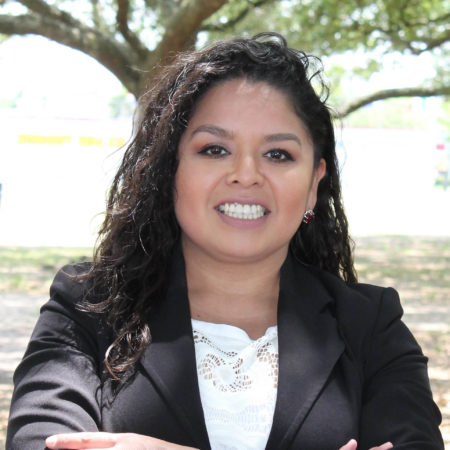
Sandra Rodríguez
“She is a native Houstonian and 34-year resident of the Gulfton neighborhood with two decades of experience in public service. She’s focused on areas of engagement, revitalization and education in under-resourced communities. She is a product of HISD schools within District J and led the Southwest/Hiram Clarke Multi-Service Centers, serves as the President of the Gulfton Super Neighborhood Council.”
- Do you support new construction in the 100-year floodplain?
No. I will look at limiting new development to mitigate downstream flooding. - Would you support strengthening the minimum water detention requirements for development projects?
Yes. By strengthening the minimum water detention requirements, it will limit the rate of water and increase of runoff. - Would you support requiring landlords to disclose a property’s flood risk to potential renters?
Yes. This will help owners and renters understand their flooding risk. - Do you believe a comprehensive flood mitigation plan needs to address climate change? If yes, how?
Yes, we want to move towards a climate-resilient and low-emissions strategies to address climate change. One of the strategies to mitigate flooding is access to green space. Utilize it as a detention basin, trails, parks and economic development opportunity. - What would you do to increase the affordable housing stock outside of flood-prone areas?
The affordable housing crises should be addressed throughout the entire region. We need to work with the county and city to ensure we provide affordable housing options. - How can the city improve its emergency response during natural disasters?
A flood warning system and flood alert system would be effective for the entire region if it were implemented throughout. This would provide individuals the opportunity to make informed decisions on what they need to do during a flood event. It will provide real-time information regarding areas that are flooded. - How can the city and county work more closely to provide a unified flood mitigation plan?
We need to focus on a regional systems approach founded on science-based assessment, community planning and multi-sector consensus for real and lasting change. We need to work together to develop a range of solutions such as education, structural measures, green infrastructure, warning system, stricter development regulations and repairs to local drainage systems.
District K

Gerry Vander-Lyn
“I am a native Houstonian, a former Series 7 Registered Representative, and I am passionate about common sense and holding elected officials accountable to ethical standards.”
- Do you support new construction in the 100-year floodplain?
No. I think the City should take advantage of opportunities to increase green space especially along the bayous and drainage ditches. I think we should take advantage of opportunities to buy property in the 100-year floodplain as those opportunities arise. - Would you support strengthening the minimum water detention requirements for development projects?
Yes. Development does require increased drainage capacity. We need to balance needs between providing housing and businesses for residents and protecting those investments from flooding. Increased detention requirements is one way to do that. - Would you support requiring landlords to disclose a property’s flood risk to potential renters?
Yes. As a renter, I support that as well as disclosing how much rent goes to pay property tax. We need to figure out a way to allow seniors who rent to take advantage of property tax discounts. - Do you believe a comprehensive flood mitigation plan needs to address climate change? If yes, how?
The how comes before the yes or no. At the moment, the science indicates that the primary factors affecting climate are the presence or absence of solar storms and the presence or absence of water vapor (clouds). I am open to looking at proposals that might help in that regard, but they will need to be backed by rigorous science. - What would you do to increase the affordable housing stock outside of flood-prone areas?
The way a housing project is designed is crucial. Not all affordable housing is done well. The other crucial aspect is community buy-in. Ft Bend SN #41 is a good example of a community that has done its research and are in favor of some proposed projects and opposed to others. I would support the individual communities in achieving the projects they feel fits their needs. - How can the city improve its emergency response during natural disasters?
First of all, the Mayor should not tell half the first responders to stand down. Secondly, a regional disaster plan that is clear and that all players follow is crucial. During Harvey, the District Attorney followed her own plan which failed. The courts are still struggling to recover from that disaster. - How can the city and county work more closely to provide a unified flood mitigation plan?
The City is responsible for keeping the drainage pipes maintained and the drainage ditches cleaned out. They are not doing that. Currently the County is spending more time on politics than actually making sure that County services are being efficiently delivered. A more experienced Mayor and County Judge would help. The third piece would be for the new players to work together and help each other.

Kim Sauke
“Kim Sauke is an experienced healthcare professional with demonstrated strong management skills and earned an MBA from Texas Women’s University in 2016. She is skilled in intensive care nursing as well as home-health. This experience strengthened her appreciation for the needs of residents of Houston. A board member of Willow Meadows Civic Club she is also a mother of two grown children.”
- Do you support new construction in the 100-year floodplain?
Yes. Further development in the 100-year floodplain will only exacerbate the already existing problem in Houston. However, with new designs for flood management implemented, and building for the event of flooding in the scope of work, I support new construction. - Would you support strengthening the minimum water detention requirements for development projects?
Yes. The detention requirements were set for Houston more than 30 years ago. Technology advancement since then has provided data that minimum water detention requirements need to be increased. - Would you support requiring landlords to disclose a property’s flood risk to potential renters?
Yes. A disclosure will give transparency to the potential renter so that they can make an informed decision on whether to rent or not. Renters may have mobility issues and/or health conditions that necessitate flood information. Also, upon an actual flood, sufficient disclosure was given to avoid undo conflict or legal action between the renter and owner. - Do you believe a comprehensive flood mitigation plan needs to address climate change? If yes, how?
No. - What would you do to increase the affordable housing stock outside of flood-prone areas?
Affordable housing built outside of the floodplain would benefit from locations that have easy access to public transportation. Federal funding will be used to build units or other available sources. The housing projects would have a rent control in place so that the current rent of units can increase by the cost of living per year. If it is 3%, then the cost could increase by 3%. - How can the city improve its emergency response during natural disasters?
The Houston Firefighters are central and dynamic to the emergency response during natural disasters. They must be honored, recognized, rewarded and paid in order to assist with improvement of emergency responses. Firefighters will not be told to stay home during a disaster at a similar magnitude of the Harvey flood or even less. They will serve. All buildings will have a documented emergency plan. - How can the city and county work more closely to provide a unified flood mitigation plan?
Unfortunately, the city and county have not worked closely. The $4 billion in federal funding targeted for flood prevention, will be managed from Austin as announced by Governor Greg Abbott this month. Once more, the city of Houston has not demonstrated effective and timely execution of the horrendous flooding fiasco that plagues our great metropolis.
At-Large Position 1
Larry Blackmon
- Do you support new construction in the 100-year floodplain?
Yes. - Would you support strengthening the minimum water detention requirements for development projects?
No. The CITY OF HOUSTON needs a comprehensive flood plan for major adjustments in the infrastructure to the development of LIFT STATIONS. These giant pumps can direct and redirect water determined by the identified computer pinpoint saturation areas. And the ability to receive federal and state recovery funds faster. - Would you support requiring landlords to disclose a property’s flood risk to potential renters?
Yes. Should be a mandatory requirement of understanding. Before moving, call the property. - Do you believe a comprehensive flood mitigation plan needs to address climate change? If yes, how?
Yes, modern science has now shown us that climate change does exist! And we should plan accordingly to various future models. - What would you do to increase the affordable housing stock outside of flood-prone areas?
Increase more green space in plans. - How can the city improve its emergency response during natural disasters?
We must increase our High power intensity emergency vehicle fleet 4 runners and emergency boats and elevation of evacuation routes! - How can the city and county work more closely to provide a unified flood mitigation plan?
Houston must adapt a comprehensive flood plan itself first, then lobby the state for interaction plans with the surrounding counties for flood mitigation to work cooperatively in efforts with the surrounding counties of Houston!

Mike Knox (Incumbent)
“Native Houstonian. USAF Veteran. Retired Texas Peace officer (HPD). Author and Consultant on Gang and Youth Violence”
- Do you support new construction in the 100-year floodplain?
No. - Would you support strengthening the minimum water detention requirements for development projects?
Yes. - Would you support requiring landlords to disclose a property’s flood risk to potential renters?
Yes. - Do you believe a comprehensive flood mitigation plan needs to address climate change? If yes, how?
No. - What would you do to increase the affordable housing stock outside of flood-prone areas?
I support the use of opportunity zones in concert with the Houston Land bank to work with builders to build single family homes. - How can the city improve its emergency response during natural disasters?
One way, which we learned during Harvey, is to better utilize social media. We need to have a way to capture requests for service/rescue in addition to 911 calls so that individuals needing assistance can contact the city for help in the event of a 911 call center overload. - How can the city and county work more closely to provide a unified flood mitigation plan?
The city and county are beginning to work more closely together to develop regional flood mitigation plans and to identify projects that work together to provide the most beneficial flood mitigation for the region. I think we can expand on this new cooperative effort in the future.

Raj Salhotra
“I am a native Houstonian running for Houston City Council to Build One Houston where everyone has access to opportunity. I grew up here, attended Rice University, and then became a high school math teacher in the Hiram-Clarke area. After teaching, I attended Harvard Law School and founded and ran an educational non-profit called Students With Ambition Go (SWAG) To College.”
- Do you support new construction in the 100-year floodplain?
No. I think we need to dramatically improve our drainage and flood mitigation before we allow new development in the 100-year floodplain. Moreover, I think we should increase minimum detention requirements before we allow new construction. Finally, we must have more parks and greenspace to offset the effect of new concrete. - Would you support strengthening the minimum water detention requirements for development projects?
Yes. I believe we must increase detention to prevent flooding; moreover, we know that increased concrete (which is a by-product of increased development) will increase runoff and therefore increase flooding. Thus, we should strengthen minimum detention requirements to mitigate this risk. - Would you support requiring landlords to disclose a property’s flood risk to potential renters?
Yes. Many folks who are renters do not know the status of their house vis-a-vis flooding. Perhaps they are new to Houston or new to the area. Thus, we should promote transparency by requiring such disclosure. - Do you believe a comprehensive flood mitigation plan needs to address climate change? If yes, how?
Yes, because I believe that climate change is contributing to extreme weather events which results in worse flooding. Specifically, I support the Climate Action Plan with its goals on transit, buildings, and power-generation. Quite simply, we need to look to get to net-zero emissions by 2050 at the latest and hopefully by 2040. This will help reduce the extreme weather events. - What would you do to increase the affordable housing stock outside of flood-prone areas?
I think we should: (1) add criteria to the CDBG and affordable housing grants we give that promote development outside the floodplain; (2) we should pursue mixed-use housing as well across the City but importantly outside the flood-prone areas; and (3) we should work with the Housing Authorities to expand housing outside flood-prone areas. - How can the city improve its emergency response during natural disasters?
We should: (1) have an automatic alert system sharing information in multiple languages; (2) we should coordinate our response with neighboring cities and the County; (3) we should not release water knowing it will flood folks; and (4) we should provide folks more information in the process. - How can the city and county work more closely to provide a unified flood mitigation plan?
I believe the City and County should: (1) develop a unified plan; (2) use their flood mitigation dollars to support each other’s projects; (3) coordinate specific improvements that will make the biggest impact; (4) and develop a broad alert system that can be used in disasters.
At-Large Position 2

Michael Griffin
- Do you support new construction in the 100-year floodplain?
Yes. Provided the new rules and regulations on the retention ponds are constructed and strictly adhered to. - Would you support strengthening the minimum water detention requirements for development projects?
Yes. - Would you support requiring landlords to disclose a property’s flood risk to potential renters?
Yes. - Do you believe a comprehensive flood mitigation plan needs to address climate change? If yes, how?
Not sure. - What would you do to increase the affordable housing stock outside of flood-prone areas?
Speed up the permitting processes and reduce the permitting fees. Oversight on permit approval times. - How can the city improve its emergency response during natural disasters?
Increase pre-disaster planning, by beginning earlier. - How can the city and county work more closely to provide a unified flood mitigation plan?
Improve communication between county and city.
Rev Willie Davis
“I am a native Houstonian born in 3rd Ward Tx, and educated by HISD. I attended Sam Houston State University, Texas Southern University and Cameron University of Lawton, Oklahoma and Texas School of Theology. I volunteered during Vietnam in the United States Army and served with the 1st Special Forces Group Green Beret and I am proud of my service. I presently serve on the Board of Trustees of HBU.”
- Do you support new construction in the 100-year floodplain?
Yes. I support new construction in the 100 year floodplain that does not remove green space. - Would you support strengthening the minimum water detention requirements for development projects?
Yes. I absolutely support strengthening requirements because we have too much concrete in our city and not enough water detention. - Would you support requiring landlords to disclose a property’s flood risk to potential renters?
Yes. I definitely support requiring landlords to disclose a property flood risk because the renter has a right to know and most renters pay the drainage fee cost in their water bill or lease rent. - Do you believe a comprehensive flood mitigation plan needs to address climate change? If yes, how?
No - What would you do to increase the affordable housing stock outside of flood-prone areas?
This question is very confusing, but to give an answer I certainly support affordable housing first and foremost. I don’t understand the outside of flood prone areas. - How can the city improve its emergency response during natural disasters?
I think the city presently does a great job now in emergency response with the resources it has. There is always improvement needed based upon the disasters, and we have done excellent in our previous emergency response. - How can the city and county work more closely to provide a unified flood mitigation plan?
I believe the City and the County can work more closely to provide a unified flood mitigation plan by forming a joint committee that includes representatives from every area of our city and county to assess each area based upon how affected they were and which area needs to be served immediately.

Jim Honey
“Fourth-generation Houstonian that loves Houston and fears for its future; engineer and HS math teacher; activist for 40 years; fiscally conservative & socially progressive.”
- Do you support new construction in the 100-year floodplain?
Yes, but with appropriate changes to code. Dramatic changes to pavement; elevation of structures; restrictions on sizes/types/uses of structures. There is simply too much real estate to either buy back or remove from use. Getting flooded can have as much to do with where the storm ‘camps out’ as where one is in the floodplains. - Would you support strengthening the minimum water detention requirements for development projects?
Yes. Positively. Lack of detention is indisputably part of our problem and a tool for mitigation. Responsibilities for detention have been mismanaged, ignored, disregarded, and this must stop. - Would you support requiring landlords to disclose a property’s flood risk to potential renters?
Yes. There are already disclosure requirements in home sales, why not rentals too? Not protecting or warning people from predictable harm is unconscionable. Also, if properties are prone to flooding, let the disclosure and resulting market pressure encourage repair or replacement. - Do you believe a comprehensive flood mitigation plan needs to address climate change? If yes, how?
Not sure what is being asked, but I’ll say, Yes, of course, in practice and theory, but there isn’t any need to use the term. It has become an irrationally charged word for people on both sides so just assume things are getting worse and depart from there in policy formation and decisions without getting caught up in emotional debates. - What would you do to increase the affordable housing stock outside of flood-prone areas?
Houston was in an affordable housing crisis BEFORE Harvey and now it’s worse. We have recently improved policies (e.g., available financing) to encourage developers to build affordable housing but there needs to be more outreach and education to real estate agents, developers, and buyers. Force the Midtown TIRZ and others to work with CoH. Adopt principles set forth 50+ years ago by Jane Jacobs! - How can the city improve its emergency response during natural disasters?
Don’t irrationally send first responders home in times of crisis. Be sure their equipment is in proper working order through repair or replacement. Close the shortage in personnel. Treat them with respect and like your life depends on them – NOT AS ADVERSARIES. Don’t secretly pit them against each other to fight for pay. Succeed in flood mitigation to diminish crises. - How can the city and county work more closely to provide a unified flood mitigation plan?
This is imperative. There are PERCEPTION & INFORMATION problems. Projects are being completed but the public is unaware of them. Then there are projects being conceived but progress is slow & unseen. I previously called for a ‘TIGER TEAM’ of counties, ACoE, HCFC, & CoH to meet weekly & publicly like city council with posted action items, delivery/accomplish dates, etc. for PUBLIC REVIEW.

David W. Robinson (Incumbent)
“I am a second term incumbent running for my third and final term on Houston’s City Council. Additionally, as the son of a political scientist who instilled in me a strong sense of civic pride and duty at a young age, I’ve volunteered on a number of campaigns throughout my life and have worked with various elected officials in my role as a public servant, engaged civic leader and commissioner.”
- Do you support new construction in the 100-year floodplain?
No. After Hurricane Harvey, Houston City Council revised Chapter 19, Houston’s Floodplain Ordinance, to raise the base flood level to the current 500 year maps plus 24”, increasing the elevation permissible for new construction within the city, protecting neighborhoods with more stringent regulations, and making the city more resilient as we build forward from recent storms. - Would you support strengthening the minimum water detention requirements for development projects?
Yes. The detention of appropriate storm water runoff is an important but challenging requirement for new development. It is critical that we strike the right balance between providing onsite capacity for new and redeveloped properties, while not encumbering commercial and residential projects with unfair or unreasonable required volumes. - Would you support requiring landlords to disclose a property’s flood risk to potential renters?
Yes. Flood disclosures should be made if a rental unit has been damaged by flood waters in the past or if the existing property is located within the 100 or 500-year floodplains. Such disclosure should include the number of times that the subject property and unit has flooded in recent years. - Do you believe a comprehensive flood mitigation plan needs to address climate change? If yes, how?
A comprehensive flood mitigation plan needs to take advantage of the best available science and data to inform both current and prospective development in Houston and our broader multi-county region. Houston’s current Climate Action Plan addresses many of the critical issues related to our development and growth, and should be used as a structure and framework to build into the future. - What would you do to increase the affordable housing stock outside of flood-prone areas?
The Complete Communities program provides improved opportunities for affordable housing in historically under-resourced neighborhoods that we must help to assist increase the amount of access to services in the city. The Housing and Community Development Department is engaged as well by making the most of federal relief dollars that can catalyze activities to provide a higher standard of living. - How can the city improve its emergency response during natural disasters?
The City of Houston, Harris County, and the other local jurisdictional authorities must work together to improve our collective response to natural disasters. The timeliness of our collaboration to natural disasters is becoming more and more critical with the increased threats to our regional population and infrastructure from global warming. - How can the city and county work more closely to provide a unified flood mitigation plan?
Unifying development standards and prevailing building codes will be critical for simplifying the systems that our development sources will be able to apply. Meanwhile, the Harris County Flood Control District and the city’s Planning and Public Works Department can improve ongoing resiliency efforts by making the most out of the $2.5 billion bond program.

Emily Muñoz Detoto
“I have been a lawyer for the people for the last 23 years. I have traveled all over the State fighting for people’s rights: one case at a time, one client at a time. I have earned a reputation of being the “go-to” lawyer who solves complex problems. I teach all over the Country and am a born advocate I am running for City Council to restore the public’s faith in city government and fight for all Houstonians.”
- Do you support new construction in the 100-year floodplain?
No. Many of the floods that we’ve encountered in the last several years have been in the 100 AND 500-year floodplain. - Would you support strengthening the minimum water detention requirements for development projects?
Yes. The newer developments that have been the focal point in the area (Woodbridge – Kingwood) where they have caused flooding by not mitigating water retention or a means of into existing neighborhoods that did not used to flood in the past (Elm Grove – Kingwood). - Would you support requiring landlords to disclose a property’s flood risk to potential renters?
Yes. I believe that if the landlord wants to continue having reliable residents, they need to be reliable in communicating that the potential renter is in a floodplain. This impacts both the tenant and the landlord. It would further benefit the landlord in keeping them from possibly being sued by tenants for failure to communicate such an important fact. - Do you believe a comprehensive flood mitigation plan needs to address climate change? If yes, how?
The climate is going to change no matter what. Man is not capable of keeping up nor completely able to control it. Flood mitigation isn’t a matter of climate change. Flood mitigation is a matter of having enough infrastructure in place to counteract how we build and expand as a society. More concrete and asphalt takes away the earth’s capability to absorb the water it generates. - What would you do to increase the affordable housing stock outside of flood-prone areas?
Reduce taxes and actually utilize the “rain tax” to fund those drainage projects. - How can the city improve its emergency response during natural disasters?
The city has needed a leader and someone that is capable of handling disasters. The city and its administration have fallen short in that area. Furthermore, when things look threatening, tell people to get out of harms way, don’t tell them to stay put. This was Mayor Turner’s plan and it failed both times. - How can the city and county work more closely to provide a unified flood mitigation plan?
The city and county have money at their disposal by way of bonds that were passed by the voters. Use those bonds to fund the projects that were identified under the previous county judge. Granted, it’s not an end all be all to the issue, it is however a great start. Let’s get to work on those instead of pet projects for our current city and county government.
At-Large Position 3
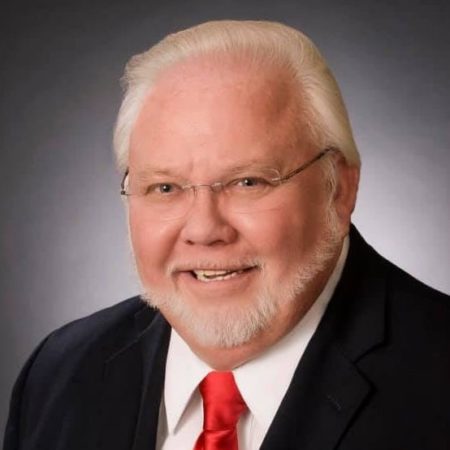
Michael Kubosh (Incumbent)
- Do you support new construction in the 100-year floodplain?
No. If there is an existing home and the homeowner wants to enlarge, then the construction must be 2 feet above the 500 year flood plain. That is our City Ordinance. - Would you support strengthening the minimum water detention requirements for development projects?
Yes. Keeping runoff flood water from flooding the community is a must. - Would you support requiring landlords to disclose a property’s flood risk to potential renters?
Yes. Floods can cause loss of life and Property. Renters need to know the past flood history and risks. - Do you believe a comprehensive flood mitigation plan needs to address climate change? If yes, how?
The Climate is certainly changing. We need a REGIONAL FLOOD MITIGATION PLAN DEVELOPED. Flood water knows no city or county limits. - What would you do to increase the affordable housing stock outside of flood-prone areas?
There needs to be an increase in affordable housing and certainly for Seniors. - How can the city improve its emergency response during natural disasters?
During Hurricane Harvey the Firefighters were told not to come in. This was a huge mistake and we do not want to repeat this in the future. - How can the city and county work more closely to provide a unified flood mitigation plan?
Much bigger than City of Houston and Harris County. This is a Regional matter that must get financial help from the State and Federal Government. Remember Kingwood flooded due to the release of the water from Lake Conroe, which is over 30 miles from Kingwood. There must be an overall regional plan and we need to tap the State’s Rainy day fund to protect the citizens in our region.
Jose Carlos Gonzalez
- Do you support new construction in the 100-year floodplain?
Yes. I support new SMART construction in the 100 year floodplain. Smart development abides by strict development regulation and does not increase run-off downstream. The Gonzalez for City Council at Large #3 campaign has a strong homeland security plan, and flood prevention is an important part of that plan given the ‘multiplier effects’ that climatic events have on our safety and security. - Would you support strengthening the minimum water detention requirements for development projects?
Yes. Climatic events such as floods are ‘threat multipliers’ (DOD) for homeland security, and an existential problem for many communities in the city of Houston. As such, strengthening water detention requirements and new development requirements, has to be an integral part of the city’s plan to mitigate the effects and prevent floods. - Would you support requiring landlords to disclose a property’s flood risk to potential renters?
No. Requiring landlords to disclose a property’s risk of flood would be placed under consideration. - Do you believe a comprehensive flood mitigation plan needs to address climate change? If yes, how?
Yes. The ‘threat multiplier’ effect of floods is seen when deficient wastewater treatment plants (see EPA consent decree) cause sewage overflows, for example, thereby exposing people to disease like infections including Diarrhea and disenteria. Gonzalez for City Council at Large #3 campaign has a strong homeland security plan, and flood prevention is an important part of that plan. - What would you do to increase the affordable housing stock outside of flood-prone areas?
Affordable housing would be increased through programs such as the Houston Community Land Trust, which limit the appreciation of property by retaining ownership of the land underneath the house, thereby ‘locking’ affordability for many years, while allowing the owner to build equity on the construction. - How can the city improve its emergency response during natural disasters?
The city can best improve its response to climatic emergencies by being prepared for climatic emergencies. Mitigation and preparedness are a big component in the homeland security plan of the Gonzalez for City Council at Large #3 campaign. - How can the city and county work more closely to provide a unified flood mitigation plan?
The city and county can best work together on a unified flood mitigation plan by creating a permanent homeland security working group to work together in order to plan, coordinate and execute emergency plans. If elected to city council I will seek appointment to the homeland security committee and spearhead the creation and management of this intracity council of government working task force.

Marcel McClinton
“Marcel is an activist, organizer, and gun violence survivor. Marcel was a co-organizer of Houston’s March For Our Lives where 15,000 Houstonians marched demanding sensible gun laws. After being appointed to the Mayor’s Gun Task Force he became increasingly passionate about finding ways our local government can be more efficient in tackling issues like flooding, crime, and traffic congestion.”
- Do you support new construction in the 100-year floodplain?
No. I don’t support new construction in the 100-year floodplain, because it’d be reckless to put Houston families in direct danger while also not requiring developers to tell these buyers that they should obtain flood insurance. Grants should be offered for elevation projects to those who’d prefer to stay in their neighborhoods if prone to severe flooding. - Would you support strengthening the minimum water detention requirements for development projects?
Yes. We’ve seen major storms hit our city for decades, but they’re getting stronger, and more dangerous. We need to strengthen the minimum water detention requirements, and reconstruct our drainage systems to hold the amount of water our city braces for when hurricanes and tropical storms hit. As of right now we are ill prepared. - Would you support requiring landlords to disclose a property’s flood risk to potential renters?
Yes. Landlords must be required to disclose their property’s flood risk and encourage renters to obtain flood insurance if they’re still willing to move in/continue residing. We need to push transparency, honesty, and human decency. To deter flooding near homes we need to expand green space that can double as retention ponds. These often serve as a last line of defense for neighborhoods like mine. - Do you believe a comprehensive flood mitigation plan needs to address climate change? If yes, how?
Our city has the unique ability to lead the globe on combating climate change, as we are the ‘Energy Capital of the World’. Other governments will follow our lead and take on aggressive climate action which will, overtime, lessen the dangers that we currently face. We need both a flood-mitigation-specific plan on top of a bold climate change action plan. - What would you do to increase the affordable housing stock outside of flood-prone areas?
I support the semi-new model introduced in the city where buyers would “purchase only the house & lease the land under it from the nonprofit land trust, significantly lowering the purchase price and the annual property tax bill.” (Houston Chron) The home’s resale value would be limited to ensure it remains affordable in the market. - How can the city improve its emergency response during natural disasters?
We failed Houstonians during Harvey by keeping our firefighters at home during the floods and we saw many good people in our city step up to assist our limited first responders on the ground. Coordination between the city and the Office of Emergency Management must remain transparent. Critical information for the public should be released on social media, in the news, and through phone alerts as soon as we understand the facts. - How can the city and county work more closely to provide a unified flood mitigation plan?
I believe in quality and genuine collaboration. All key players must come to the table and start from scratch. We need to include county officials, city officials, first responders, engineers, climate experts and the community in this process.
At-Large Position 4

Ericka McCrutcheon
“I am a wife of 30 years (John), a Business Owner (The Dunamis Group, LLC), a Realtor (Royce Realty Commercial Realty), Pastor’s wife and President of the Kirkwood Civic Club. I have and do actively served my community in Civic pride with dedicated, principled and determined Leadership. Our City is facing many challenges that need strong Leadership that works for the people to get the job done.”
- Do you support new construction in the 100-year floodplain?
Yes, we must remember that most of the flooding took place outside of the 100 and 500- year floodplains. There is no need for developments to cease new construction in these areas. However, developments should be built to the standards as outlined in the City Building Codes. - Would you support strengthening the minimum water detention requirements for development projects?
Yes, I support measures that are outlined in the City Codes and to strengthen the enforcement of these policies for compliance. - Would you support requiring landlords to disclose a property’s flood risk to potential renters?
Yes. This makes sense! People who rent should also ask about the property history. It is the responsibility of everyone to know the environment and floodways that are in and around their immediate community in which they live. Education and preparation are keys to resiliency. - Do you believe a comprehensive flood mitigation plan needs to address climate change? If yes, how?
Although I recognize that the earth’s weather pattern has changed, I do not believe that human beings caused climate change. However, it is a good idea to plan for the awkward weather changes as best as possible. - What would you do to increase the affordable housing stock outside of flood-prone areas?
Encourage developers to build more affordable housing outside the flood-prone areas and offer tax incentives that encourage more private and public partnerships. I would help people connect with the first-time home buyers program to purchase new homes, which will strengthen the economy. - How can the city improve its emergency response during natural disasters?
Having enough adequately trained Firefighters and Policemen is key. Work with Community Leadership and preparing each community though Super neighborhood and Civic Organizations in peace times, so that each community can be prepared to act in the event of a natural disaster. Identity and develop safe places in each community and have drills so that people will know what to do and where to go. - How can the city and county work more closely to provide a unified flood mitigation plan?
It is good to know what the right and left hands are doing. So this will require frequent meetings at the worksites where the work is being performed and proposed according to plan. Priority and accountability are a must, and the faster release of project funding to speed up the work processes.
![]()
James “Joe” Joseph
“As a business owner with 20 years in management, associate pastor, author of two books, my contributions to communities have been recognized at local, state and Congressional levels and underscore my commitment to excellence, leadership and vision.
I established strategic partnerships to feed 60,000 people and advocated for a grocery store opening in one of Houston’s underserved food deserts.”
- Do you support new construction in the 100-year floodplain?
Yes. If private insurers are willing to underwrite the risk and private citizens decide to reside there with full disclosure, new construction may be regulated to mitigate flood risk by building up base of property and water retention measures. - Would you support strengthening the minimum water detention requirements for development projects?
Yes. That is the proper way to hold developers accountable. The marginal cost to new construction from the city ordinance requiring 2 ft build up is a start to offset the effects of potential flooding and makes sense for smart infrastructure to alleviate risk to residents and businesses who moved to area in good faith before excessive construction negatively impacted the area’s flood dynamics. - Would you support requiring landlords to disclose a property’s flood risk to potential renters?
Yes. Just as homeowners are provided disclosure, renters should be made aware of flood risk as well. - Do you believe a comprehensive flood mitigation plan needs to address climate change? If yes, how?
Hiring preeminently qualified engineers for effective flood management. Many routine 311 calls are better accounted for by systematic projects at scale and than random short-term fixes. Infrastructure is not an end unto itself, we may learn where Build Houston Forward projects follow patterns of growth and development that may sustain and attract other investment for a more complete community. - What would you do to increase the affordable housing stock outside of flood-prone areas?
Reduce parking space requirements on housing construction to keep housing costs low and encourage housing density where it makes sense for more walkable communities outside of flood-prone areas. I advocate for more equitable development of affordable housing throughout the city to counter how the concentration of affordable or low-income housing has been segregated to certain parts of the city. - How can the city improve its emergency response during natural disasters?
Several measures improve emergency response during natural disasters:
*Hiring the most qualified people as first responders.
*Strengthening our emergency response plan with more education and awareness to residents, businesses and community organizations.
*Establishing network of community response teams that are prepared to respond with people and resources in advance of natural disasters. - How can the city and county work more closely to provide a unified flood mitigation plan?
Functional consolidation of infrastructure planning would allow the city to synchronize efforts with the county on flood mitigation.

Bill Baldwin
“I have a proven track record as a volunteer in helping make Houston a better place for us all. My experience at the City-level includes 3.5 years as Planning Commissioner and chairing the Walkable Places Committee, where I demonstrated a forward-thinking approach to Houston’s development centered on transit-oriented and business-friendly policies that set the stage for a denser urban core.”
- Do you support new construction in the 100-year floodplain?
Yes. It isn’t a question of whether we should build in the 100-year floodplain but how. The Ch. 19 revisions now requiring that homes be elevated 2-ft above the 500-year flood level in both the 100-/500-year floodplains has given us decent standards for now. Not building would remove far too much from taxable value, housing costs would rise untenably, and the City couldn’t maintain so much vacant land. - Would you support strengthening the minimum water detention requirements for development projects?
Yes. In addition to increasing detention requirements, we must be sure to also increase flood resilience and mitigation by decreasing the level of maximum impervious cover in any development as well as improved drainage in our roads, ditches, and storm sewers. - Would you support requiring landlords to disclose a property’s flood risk to potential renters?
Yes. Absolutely, in fact, I worked in Austin on precisely this legislation. After spending 11 hours at the State Capitol the day of the vote, I was personally very disappointed to see it shot down. Apartment associations and other interest groups have been very effective in preventing this sort of legislation. I believe it is simply wrong and immoral to put renters at flood risk without disclosing. - Do you believe a comprehensive flood mitigation plan needs to address climate change? If yes, how?
Yes, and I believe the draft Climate Action Plan has been an important step in this direction. We should see it revised based on public input received this summer and put to City Council for a vote as soon as possible. I think we should also ensure we’re looking at our entire budgeting process through the lens of climate change. - What would you do to increase the affordable housing stock outside of flood-prone areas?
I believe we need to increase our dedicated revenue sources for affordable housing. I would like to look into the possibility of a Development Impact Fee that is designed to increase the funding for affordable housing in the same district in which it was levied, in the same model as how we collect and administer the Drainage Impact Fee through Build Houston Forward. - How can the city improve its emergency response during natural disasters?
We must better utilize technology and social media to provide residents with easy-to-understand, coordinated disaster response/relief resources. I have direct experience with this having spent the 112 days after Harvey in nearly full-time relief mode. We must also ensure that our budget allows for adequate equipment and training for HPD/HFD, using our new tool of zero-base budgeting wisely. - How can the city and county work more closely to provide a unified flood mitigation plan?
The City and County do work well in many areas of regional flood resilience, since our roles are clearly defined. I do think that when our transformative MAPP Next flood risk data is released, we will have a good opportunity to coordinate on revising floodplain development policies. I think our greatest area for improvement is in coordinating disaster response tied to flooding.

Letitia Plummer
“Born and raised in Houston I have spent the last 20 years in the public and private sectors of healthcare and have firsthand knowledge as a dentist of creating access to a community healthcare system for everyone. During my career as a small business owner, I have balanced budgets, created jobs, and managed a successful business that focuses on caring for the health and welfare of my patients.”
- Do you support new construction in the 100-year floodplain?
Yes. The State of Texas is a property rights state. Therefore, if a builder and a resident wants to purchase a house in 100-year floodplain, they should be able to as long as they are insured for flood damages and aware through proper notice, of being in a 100-year floodplain. - Would you support strengthening the minimum water detention requirements for development projects?
Yes. I would implement a quality review process to ensure that the detention ponds are created and they meet the minimum standards for the development. - Would you support requiring landlords to disclose a property’s flood risk to potential renters?
Yes. Landlords should be responsible in providing their tenants with information concerning obtaining flood insurance if the property has flooded before. I believe that the landlord should be required to disclose this information. - Do you believe a comprehensive flood mitigation plan needs to address climate change? If yes, how?
The city of Houston should follow the recommendations of the scientific community concerning climate change and use that information to mitigate any future potential flooding issues that may come about. - What would you do to increase the affordable housing stock outside of flood-prone areas?
Affordable housing is essential for the development of Houston and its future. The city should be looking at other cities that have had the same issue and their plans for implementing housing projects that are affordable. - How can the city improve its emergency response during natural disasters?
The city must continue to train their law enforcement officers and other public safety officials on new methods for emergency response and purchase the equipment that is needed. - How can the city and county work more closely to provide a unified flood mitigation plan?
The city is ultimately really responsible for its residents and the county is ultimately responsible for their residents. Therefore, the two local governments must teamup and work together in a coordinated effort and collaboratively instead of working in their silos.

Nick Hellyar
“Having served as a City Council staffer and having worked for a State Representative, I have experience serving the people of Houston and I will be able to effectively roll up my sleeves and get to work for constituents on day one. I have a passion for and track record of working on city projects and city issues, as well as working with neighborhoods and community leaders to get things done.”
- Do you support new construction in the 100-year floodplain?
No. Substantial updates have been made to Chapter 19 of the Code of Ordinances, the Floodplain Ordinance, making it more difficult to build in areas prone to flooding. I support these changes. Due to the recent number of catastrophic rain events, measures must be taken to lower the risks to property and life in the flood plain. - Would you support strengthening the minimum water detention requirements for development projects?
Yes. We need to ensure new development projects provide adequate flood detention and mitigation to prevent future flooding. As an At-Large Council Member, I will also work to prioritize and expedite flood projects that do the most good by focusing on the worst areas first, both in drainage and flood control, as well as street repair and replacement. - Would you support requiring landlords to disclose a property’s flood risk to potential renters?
Yes. As a real estate broker and rental property owner, I recognize that property owners owe a level of disclosure to potential renters in order to keep tenants’ lives and property safe. I fully support requiring landlords to disclose to a property’s flood history/risk to potential renters. - Do you believe a comprehensive flood mitigation plan needs to address climate change? If yes, how?
Yes, multiple things can be done to address climate change, like creating more parks and green space that act as detention ponds and deepening and widening our bayous in addition to keeping them clean. We should promote more green projects like permeable pavement and green roofs. The city must do a better job of maintaining our drainage system, keeping drains clear so they can operate properly. - What would you do to increase the affordable housing stock outside of flood-prone areas?
Affordable housing is essential to the health of our neighborhoods and the vitality of our local economy. Too often, the City builds housing only in the most economically disadvantaged parts of our city, which tend to be areas at greater risk of flooding. A better distribution of housing is needed to provide all residents similar access to quality education, public safety, and community resources. - How can the city improve its emergency response during natural disasters?
Houston must work with local, state, and federal partners to improve our emergency preparedness program with continuous inter-agency training. I will be a watchdog over the billions of Harvey recovery money coming into the city to ensure that our first responders have enough resources to replace and update their equipment and vehicles in order to respond swiftly to our citizens in times of disaster. - How can the city and county work more closely to provide a unified flood mitigation plan?
The city must partner with the Harris County Flood Control District on bayou projects to provide a unified flood mitigation solution. This includes increasing the capacity of our bayous and providing creative ways to move water through a comprehensive tunnel system. More bond money needs to be allocated to City projects through innovative financing options, such as pay as you go bond dollars.
At-Large Position 5
Ralph B. Garcia
“I’m a Texan. 65-year-old Hispanic. Semi-retired. Do legislative research and marketing. When I was 17, I served on a committee with Hubert Humphrey establishing the WIC program. Worked deregulating trucking in Texas in the 80s, and advising on Bank of America setting up banks in Texas. I’m an artist. Was the original director that established the Guadalupe Theater in San Antonio. Former felon.”
- Do you support new construction in the 100-year floodplain?
Yes. We need to refocus on new design and approaches. We seem to have set the motions for vehicular movement for evacuation. But we need drainage, retention ponds, widening of bayous and the ship channel. - Would you support strengthening the minimum water detention requirements for development projects?
Yes. Safety is a key element we need to include when we do this. - Would you support requiring landlords to disclose a property’s flood risk to potential renters?
Yes. Why can’t this be done by us…or the County..and available to the public. We do this on cars. - Do you believe a comprehensive flood mitigation plan needs to address climate change? If yes, how?
Yes. we are obviously behind on this. - What would you do to increase the affordable housing stock outside of flood-prone areas?
Money exists for this. We need to find approaches for initiating projects, create new applicants. Small, one or two house/unit developments. Develop work teams with small contractors. - How can the city improve its emergency response during natural disasters?
Better control of traffic. If a storm is approaching then a curfew or early ban of driving. Special permits for tow trucks from outside Houston to come service us. - How can the city and county work more closely to provide a unified flood mitigation plan?
This I need to learn more about. But flexibility needs to be worked into this.

Michelle Bonton
“I am a native Houstonian, wife, mother, grandmother, entrepreneur who wants to take my 30 year record of grassroots impact and advocacy to City Hall so that as Houston moves forward its residents do too.”
- Do you support new construction in the 100-year floodplain?
No. Not generally; however, I would consider some forms of green development. - Would you support strengthening the minimum water detention requirements for development projects?
Yes. - Would you support requiring landlords to disclose a property’s flood risk to potential renters?
Yes. - Do you believe a comprehensive flood mitigation plan needs to address climate change? If yes, how?
Yes; however, I would have to study the issue further to be able to give a meaningful response as to the “how.” Some initial thoughts are to integrate mitigation and adaptation. - What would you do to increase the affordable housing stock outside of flood-prone areas?
Offer builder incentives and home-buyer incentives - How can the city improve its emergency response during natural disasters?
Pre-determining emergency shelter sites by ZIP code; stocking materials and supplies that people in shelters will need ahead of time; providing financial support to private shelter sites; implement mandatory evacuations sooner - How can the city and county work more closely to provide a unified flood mitigation plan?
Streamline the process; have a single system from which to work; uniform policies across both the city and county

Sallie Alcorn
“I’m a mom, wife, and dedicated public servant running for Houston City Council to continue serving the city I love. I’ve gained extensive experience in local government working in the city’s housing department, three city council offices and for the city’s flood czar.”
- Do you support new construction in the 100-year floodplain?
No. - Would you support strengthening the minimum water detention requirements for development projects?
Yes. I’m in favor of strengthening requirements, but requirements should not be one-size-fits-all. Different watersheds have different characteristics. The city should take into account the drainage capabilities of each watershed and where in the watershed detention is needed – upstream or downstream. - Would you support requiring landlords to disclose a property’s flood risk to potential renters?
Yes. - Do you believe a comprehensive flood mitigation plan needs to address climate change? If yes, how?
Yes, storms are more frequent and intense due to climate change. Increased ocean heat is supercharging the rainfall potential of storms. A comprehensive flood mitigation plan must incorporate elements of the city’s climate action plan and must include increased use of green storm water infrastructure to improve climate resiliency, manage flood risk and reduce heat island effect. - What would you do to increase the affordable housing stock outside of flood-prone areas?
Use city HUD grant funds, TIRZ affordable housing funds and other economic incentives to promote the development of affordable and mixed-income housing outside of flood prone areas. - How can the city improve its emergency response during natural disasters?
The city’s office of emergency management should continue comprehensive situation planning and drills to ensure the city is fully prepared. Flood warning systems and alerts should be strengthened to include predictive data. - How can the city and county work more closely to provide a unified flood mitigation plan?
It’s going to take massive cross-governmental collaboration of effort and money to get the major projects done to take the most people out of harm’s way. The city must carefully coordinate its projects with those of the Harris County Flood Control district bond projects, especially in anticipation of the $1 billion in mitigation funds the city is due to receive from HUD.

Marvin McNeese, Jr.
“Dr. Marvin McNeese, Jr. is compelled to use his research skills to serve Houston. He teaches government at the College of Biblical Studies in Houston. He earned Masters in Public Affairs and Latin American Studies from UT Austin and a Ph.D. in Political Science from Rice University. He consults with churches on faith-based community development and is a Deacon at Houston’s First Baptist Church.”
- Do you support new construction in the 100-year floodplain?
Yes. If the market (buyers and sellers) want to live in a floodplain, then let them, as long as that development is built to withstand flooding and to not exacerbate it for others up- or downstream. - Would you support strengthening the minimum water detention requirements for development projects?
Yes. I am particularly in favor of requiring permeable pavement for driveways and parking lots. - Would you support requiring landlords to disclose a property’s flood risk to potential renters?
Yes. During any transaction, buyers (renters) and sellers (landlords) should have all the information about the product/service being considered before the transaction is concluded. - Do you believe a comprehensive flood mitigation plan needs to address climate change? If yes, how?
Let’s not muddy the waters, pardon the pun. Mitigating flooding is important, and combating climate change is important, but bringing the two together in policy implementation stirs up political chatter that could distract us from making progress in these areas. - What would you do to increase the affordable housing stock outside of flood-prone areas?
Define affordable to mean at and below the median income level (around $60,000). Eight of the City’s Tax Increment Reinvestment Zones contribute 1/3 of their increments to affordable housing. The City needs to more rapidly deploy those funds along with HUD funds to build housing on government owned land, especially those parcels that can be grouped into larger, neighborhood-like collections. - How can the city improve its emergency response during natural disasters?
Practice its emergency response protocols developed in response to Hurricanes Ike and Rita at least every year, then actually follow those protocols during an emergency (which it did not during Harvey). This in conjunction with the County. Use the FCC Wireless Alert System (think Amber alerts) to push notifications of flooding risk to cell phones rather than the opt-in system in use now. - How can the city and county work more closely to provide a unified flood mitigation plan?
Move from a water-shed specific approach to a regional one, with more leadership (even funding approval) coming from the Regional Flood Management Committee of the Houston Galveston Area Council (provided Houston and Harris County are given more voting power on that committee).

Sonia Rivera
“Sonia raised two children as a single mother, while working full time and attending college, through hard work/dedication became an Entrepreneur. Sonia has led a life of service to others through volunteer work and engaging in community reinvestment projects, forming strategic partnerships, and working with city/state government. She attributes her success to a strong faith in God and commitment to serve.”
- Do you support new construction in the 100-year floodplain?
Yes. I support development in the 100-year floodplain, however I strongly support enforcement of contractors following the new regulations building up 18 inches from previous requirements, that construction is built twice as high, and permits require a pier-and-beam foundation and additional wind design. - Would you support strengthening the minimum water detention requirements for development projects?
Yes. We must enforce existing requirements, in addition to mandating that developers have taken necessary steps to determine the impact of building, by identifying how the new development will include strategies into their projects to mitigate flooding, and enforcement that they build accordingly. - Would you support requiring landlords to disclose a property’s flood risk to potential renters?
Yes. Knowledge of flooding should always be disclosed to tenants as part of a tenant rights contract, so they may make an informed decision and plan accordingly. - Do you believe a comprehensive flood mitigation plan needs to address climate change? If yes, how?
Flood mitigation plans should factor in environmental impact. - What would you do to increase the affordable housing stock outside of flood-prone areas?
We must determine whether to rebuild or move neighborhoods that are in flood-prone areas. We also must review housing development policies to allow developers to place affordable housing lower-flood-risk areas throughout the city. We must also evaluate whether we should continue to be allow building homes on currently undeveloped flood plains or in high-risk flood areas. - How can the city improve its emergency response during natural disasters?
Assess high impact areas that have been hit before and evacuate when flooding is expected. Provide first responders with necessary vehicles and equipment to respond to high water rescue events, and training for such events. - How can the city and county work more closely to provide a unified flood mitigation plan?
The primary responsibility of each is ensure the safety of its citizens, therefore working together to create timely and effective joint strategies, sharing information, and effective communication among both entities would greatly reduce the loss of property and life.

Catherine Flowers
“A first generation American and a big picture thinker. Currently, on leave as CEO of Bread of Life. She has more than 20 years of nonprofit, government and corporate experience. Served as the Director of Government and Community Affairs for the Lieutenant Governor of Louisiana. Known by many as a servant leader with moxie, CF is not afraid to serve as a catalyst for change. She created the City of Houston Department of Neighborhoods and served on numerous boards.”
- Do you support new construction in the 100-year floodplain?
Yes. According to building standards all construction that is allowed in floodplain areas must have the lowest floor elevation at or above the 100-year floodplain elevation. If you have a multi-family or commercial project, you may build in the 100-year floodplain only if your lot complies with all floodplain standards. I support projects that are compliant. - Would you support strengthening the minimum water detention requirements for development projects?
Yes. Water detention is an issue and strengthening the requirements will help with solving the problem. - Would you support requiring landlords to disclose a property’s flood risk to potential renters?
Yes. Renters should not have to take unnecessary risks. - Do you believe a comprehensive flood mitigation plan needs to address climate change? If yes, how?
Climate change is real. Everything we do needs to factor in solutions to addressing. - What would you do to increase the affordable housing stock outside of flood-prone areas?
I would like to impose a vacancy tax that can be used to incentivize property owners to return abandon and blighted properties to commerce. The more affordable the projects the more incentives can be tied to the project. When property owners choose to leave property unused, a vacancy tax will be charged monthly. - How can the city improve its emergency response during natural disasters?
Preparation plus opportunity equals success. In collaboration with the County we should ensure that every community has an emergency response plan. - How can the city and county work more closely to provide a unified flood mitigation plan?
It’s not how can they work together its why aren’t they working together. Collaboration is essential to flood mitigation and the lack of partnership is a reflection of the lack of leadership.

Eric Dick
“Eric Dick is an Harris County Department of Education trustee, home insurance lawyer, and radio personality. More information can be found on him at www.ericdick.org”
- Do you support new construction in the 100-year floodplain?
No. Typically residents aren’t notified that they are in areas that flood. - Would you support strengthening the minimum water detention requirements for development projects?
Yes. Houston residents are tired of flooding every year. They actually want Houston to stop flooding while politicians are getting rich on our tax dollars. - Would you support requiring landlords to disclose a property’s flood risk to potential renters?
Yes. It is only fair to let individuals know they may be flooding. Also individual renters should be required to maintain flood policies. - Do you believe a comprehensive flood mitigation plan needs to address climate change? If yes, how?
Flooding has become the most common natural disaster in Houston. They have brought destruction to Houston almost every year, and in many areas they are getting worse. - What would you do to increase the affordable housing stock outside of flood-prone areas?
Houston had the opportunity to use in excess of $4 billion to help with flooding. Unfortunately, Governor Abbott is requiring these monies to be used through General Land Office. These are the following monies that still need to be distributed: $4,074,456,000 for Hurricane Harvey, $169,748,000 for 2016 Floods, $52,985,000 for 2015 Floods. - How can the city improve its emergency response during natural disasters?
Harris County and the City of Houston must be more timely in distributing disaster monies. Abbott announced the General Land Office would lead a $4 billion disaster mitigation program focused on larger-scale regional projects that reduce long-term risk and lessen the impact of future floods. Victims need this money instead of lining special interests pockets. - How can the city and county work more closely to provide a unified flood mitigation plan?
The city and county must timely work together with the General Land Office to distribute the $4 billion disaster mitigation program. Our city leadership has repeatedly delayed and misspent monies for disaster relief.

Ashton P. Woods
“Committed to progress and community, Ashton has focused on a range of issues including fighting for the homeless community, advocating for affordable housing, holding law enforcement and public officials accountable to the citizens of Houston, and ending violence against people of color.”
- Do you support new construction in the 100-year floodplain?
No. We have enough land to build in areas that are not in the 100-year floodplain. We must consider that the more land we use from areas that naturally buffers Houstonians from major floods, the more of a threat flooding becomes. We must find better ways to address climate change while meeting the needs of all Houstonians. - Would you support strengthening the minimum water detention requirements for development projects?
Yes. I would go further. I believe that developers should put money directly into areas where they will build properties like high rises and townhomes. Any new construction of large developments should also include infrastructure work in order to mitigate disruption of neighborhoods while increasing healthy ways to maintain our environment and that keeps Houstonians safe. - Would you support requiring landlords to disclose a property’s flood risk to potential renters?
Yes. Renters’ rights is a very important topic, and I strongly believe that we must provide stronger protections for renters including requiring the disclosure of all risks associated with any properties that are being leased out. This will allow renters to make more informed decisions in terms of renters’ insurance and flood insurance. - Do you believe a comprehensive flood mitigation plan needs to address climate change? If yes, how?
Yes, the flooding events that we have experienced can be directly correlated to climate change. We live on a rapidly warming planet, we are witnessing droughts and other dangerous environmental impacts that will affect all Houstonians directly. We must look at uses for water capture, environmentally friendly construction, permeable pavement, water pumping systems and a host of other solutions. - What would you do to increase the affordable housing stock outside of flood-prone areas?
First, we must require owners of the current stock of housing to be fair in how they choose their tenants. Affordable housing for home owners is one thing, but Houston is the land of apartments and many owners find ways to reject potential tenants. We must make housing accessible to all Houstonians as well as provide protections for renters from discrimination. - How can the city improve its emergency response during natural disasters?
We must start by taking forecasted weather events more seriously. When we get notified of potential natural disasters as leaders we must make unpopular decisions, like shutting down services and even evacuating people. One of the biggest issues is that our early warning procedures are effective, also we must create evacuations zones that are alerted when storms like Harvey approach. - How can the city and county work more closely to provide a unified flood mitigation plan?
I believe that the city and county already work together well. However, many projects need to be pushed up or accelerated to accommodate our rapidly changing environment.
Laura Isensee, Davis Land, Jared Counts, Macie Kelly, Joe Brueggeman, Marissa Cardenas and Catherine Fusillo also contributed to this project.